
























Achieve Fluency in Verbal Communication

 Dr Rejaul Karim Barbhuiya Assistant Professor, Central Institute of Educational Technology (CIET), NCERT, Ministry of Education, Government of India
Dr Rejaul Karim Barbhuiya Assistant Professor, Central Institute of Educational Technology (CIET), NCERT, Ministry of Education, Government of India
Times have changed. Today is not the time of memorising and copying. Students must be enabled to think for themselves and articulate their thoughts well. They should be able to participate meaningfully and confidently in day-to-day activities – whether they be buying groceries, registering a formal complaint, or voicing opinions freely. A problem-solving attitude, critical outlook, scientific temperament and creativity are non-negotiable skills in the 21st century.
The National Education Policy 2020 talks about technology playing an important role in improving the learning outcomes and learning experiences of children. With the growing penetration of the internet and the easy availability of smartphones and other electronic devices, both parents and teachers can participate in and supervise children's learning through various online apps, quizzes, videos, e-books, educational games and so on. In a nutshell, digital learning has the potential to impact on what children learn and how they learn.


 Dr Aakash Chowkase Post-doctoral Research Fellow, University of California, Berkeley, USA, Department of Psychology
Dr Aakash Chowkase Post-doctoral Research Fellow, University of California, Berkeley, USA, Department of Psychology
NEP 2020 acknowledges the multilingual reality of India and asserts that the bridge of home language or other familiar language is absolutely crucial for children in the foundational years, not only to help them to comprehend basic subjects, but also to acquire additional languages like English. Thus, the needs-based and systematic use of learners' home languages should be encouraged in the classrooms, along with an anxiety-free, purpose-oriented and input-rich environment.
In the post-Covid world, more than ever before, the parents' role is being seen as pivotal to children's growth and learning. The National Education Policy 2020 released by the Government of India, recognises parents as equal partners in their children's education. At home, it is important for caregivers to create a safe, engaging and positive environment for children to learn, apply themselves and have fun. Parents can also engage actively with children around their homework, curricular and co-curricular activities and projects.
Aparna Dixit Head of Content and Research, Centre for Learning Resources
In the age of globalisation and unprecedented technological advancement, English stands as a universally comprehensible medium of communication. It has evolved into one of the essential tools that learners require to thrive in today's world and secure their future. Studies from across the globe have also shown that English communication skills significantly impact on career prospects and lifelong learning.
Functional and fluent communication skills in English, encompassing the crucial facets of LSRW (Listening, Speaking, Reading, and Writing), are pivotal for children's knowledge acquisition, intellectual, social, and emotional development and lifelong learning.
In particular, robust listening and speaking skills not only form the bedrock of the language learning process but also pave the way for enhanced reading and writing capabilities. Yet, the majority of educational efforts prioritise teaching reading and writing from the very outset, sometimes neglecting listening and speaking skills. These foundational skills are often overlooked in educational institutions due to high pupil-teacher ratios, lack of opportunities to express themselves in English, and, most significantly, a lack of structured and dedicated class time for honing these skills.
It is within this context that Uolo Speak has been introduced as a groundbreaking English program tailored for learners in pre-primary to grade 8, with a special emphasis on English listening and speaking. In alignment with the National Education Policy (NEP) of 2020 and the learning outcomes set forth by the National Council of Educational Research and Training (NCERT).
The Conversations book serves as the classroom-based avenue for developing functional speaking skills. The book contains teacher-led English speaking and listening activities that adhere to the highly recommended and research-based teaching-learning method known as the Gradual Release of Responsibility (GRR). This approach systematically guides learners in mastering the targeted competencies. Through these activities, learners engage in high-quality, age-appropriate, and experiential tasks that foster confidence and fluency in English. The accompanying Teacher Manual provides in-depth implementation plans for these activities.
The mobile interface of this educational product ensures consistent practice of functional English skills. These exercises transcend conventional question types, employing cutting-edge technology to facilitate learning and provide instant feedback. For instance, learners can practise English speaking on the App and receive AI - generated feedback. This allows learners to grow skills over a period of time and gain confidence to express themselves in English in their daily lives.
Uolo Speak offers a potent, captivating, and unique learning experience for learners. It embodies a pragmatic, results-oriented approach to cultivating indispensable functional English skills required for the 21st century. We extend our warmest wishes to all educators, parents, and learners as they embark on this exciting journey with Uolo Speak, filled with fun and joyful experiences.
 Dr Laraine O'Connell
Dr Laraine O'Connell
I am a veteran English teacher and lecturer, with a great love for English and for teaching. I have taught English and trained teachers over many years. I live in South Africa and it is a wonderful experience working with a company promoting the learning of English in India.
“In the 21st century, language teaching must go beyond traditional approaches and must aim to enable students to use language skills in real-life contexts for a wide variety of purposes” (NEP, 2020).
According to Vygotsky and Krashen’s theory of second language teaching, language acquisition happens best when learners are engaged in purposeful and meaningful tasks in an anxiety-free, non-judgmental, communication-oriented, input-rich, supportive and stress-free environment, along with a lot of scaffolding practices. This approach to second-language teaching is also highlighted by the NIPUN Bharat Mission document and NEP, 2020.
In this context, the Conversations series, along with the learning activities designed in it, can play a crucial role in creating an input-rich environment, employing diverse avenues for speaking practice in a fear-free and non-judgemental setting, coupled with real-time feedback.
The book has been developed based on the ‘Gradual Release of Responsibility’ (GRR) model—a teachingand-learning model that has been widely recommended by the NEP, 2020 and the NCF, 2023. The GRR has been promoted by educational researchers and practitioners all over the world for its effectiveness in promoting student engagement and deep understanding of content and skills.
The GRR model includes three steps, each one consecutively shifting the ‘responsibility’ from teachers to learners so that learners become independent users of the language.
I do: The teacher first provides explicit instructions and modelling that initiate the learning process.
We Do: As learners begin to grasp the content and skills, the teacher also begins to shift the responsibility to them, facilitating a guided practice where the teacher and the learners participate collaboratively.
You Do: Finally, the learners take full ownership of their learning through independent practice and the application of the skills learnt in the program.
Based on this approach, there are three core instructional models on which the activities work (please refer to lesson plans in the Teachers' Manual for greater clarity). These are:
guided; Modelled speaking by the teacher Collaborative: Shared speaking between the learners and the teacher Independent practice and application by the learners
To sum it up, this has been created with a view to doing away with the fear of speaking in English among learners and allowing them to express themselves confidently in English in real-life situations.
Describing an
Answer simple questions about one’s experience
Describe an experience, in brief
Retell important details about a person
Share important and interesting things about oneself, in some details
Understand and solve short riddles
Ask riddles with appropriate body language and expression
Share some details about events
Share personal feelings
Follow instructions involving multiple steps
Give clear instructions in order to get something done
Engage in simple conversations on day-to-day topics
Answer simple questions during informal conversations
Talk about future plans and events
Make predictions about future events
Ask
Share
politely during a conversation
In order to ensure participation of the maximum number of learners during the classroom presentations and to keep the surprise element going, you can try the following quick games for inviting learners to participate:
• Randomly pick the learners’ names written on chits / ice cream sticks / playing cards.
• Ask the learners to write code names for themselves on a chit. Randomly pick the chit from the jar and ask who it belongs to.
• Call out the roll number randomly.
• Say some unique identification markers, e.g. the one who is carrying a blue water bottle, the one who has a red bag, the one who was born in the month of March, the one whose birth date is 15, the one who has curly hair, the one who has two ponytails, the one who was born on the same date as that on which the lesson is being taught, the one who has the same roll number as the date when the lesson is being taught.
• Throw a ball of paper or a plastic ball and give an opportunity to the one who catches it.
• Throw a ball of paper or a plastic ball and give an opportunity to the person who is sitting next to the one who catches it.
• Sing a song/recite a poem while students swiftly pass an object from one to the other. The one who is holding it when the song/poem ends, has to present.
• After their presentation, each student invites the next presenter.
• Open a book randomly at a page. Call out that (roll) number for presentation.
• Pick any letter flashcard from a pile of flashcards. Choose the one whose name starts/ends with that letter.
• Pick any learner’s identity card / passport-size photograph / notebook placed upside down on a table. Call that student for a presentation.
• Roll a dice once to call out a single digit (roll) number, or roll a dice twice to call out a double digit (roll) number for presentation.
• At the count of three, the learners as well as the teacher show a number from 1-10 using their fingers. The learner whose number matches the teacher’s will be invited to present.
• Play stone, paper, scissor with the whole class. Invite those students first whose action matches yours.
• At the count of three, the teacher as well as the learners will show a colour flashcard. The learners whose colour matches with the teacher’s is invited to present first.
Speak on the Spot Plan and Speak Speak on the Spot Plan and Speak Speak on the Spot Plan and Speak Speak on the Spot Plan and Speak Speak on the Spot Plan and Speak Speak on the Spot Plan and Speak Speak on the Spot Plan and Speak Speak on the Spot Plan and Speak
Speak on the Spot Plan and Speak Speak on the Spot Plan and Speak Speak on the Spot Plan and Speak Speak on the Spot Plan and Speak Speak on the Spot Plan and Speak Speak on the Spot Plan and Speak Speak on the Spot Plan and Speak Speak on the Spot Plan and Speak
Speak on the Spot Plan and Speak Speak on the Spot Plan and Speak Speak on the Spot Plan and Speak Speak on the Spot Plan and Speak Speak on the Spot Plan and Speak Speak on the Spot Plan and Speak Speak on the Spot Plan and Speak Speak on the Spot Plan and Speak
Speak on the Spot Plan and Speak Speak on the Spot Plan and Speak Speak on the Spot Plan and Speak Speak on the Spot Plan and Speak Speak on the Spot Plan and Speak Speak on the Spot Plan and Speak Speak on the Spot Plan and Speak Speak on the Spot Plan and Speak


Describing an experience
Learning Objectives: Learners will be able to:
• answer simple questions about one’s experience.
• describe an experience, in brief.
















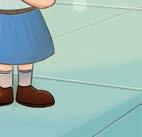


Cover Page Discussion Say:



Welcome to the Speak class. Today, we will read Chapter 1—My Experience. Look at the cover picture for one minute. Observe the things that you see in the
You may ask these suggested questions.


Instruct: picture picture. two look
How do the two girls look in the picture? (The two girls look happy and excited.)

What are the girls doing in the picture?


(In the picture, one girl is talking and the other girl is listening to her.)
2. her.)
3. bubbles?
What do you think the girl is sharing with her friend? What do you see in the
(The girl is sharing her cycling experience. In one bubble, the girl’s mother is helping her to cycle. In another bubble, she is cycling by herself.)
4.

Where do you think the children are talking? Give a reason for your answer. (The children are talking at school. I feel that because they are wearing their school uniform and standing outside a class.)
the model description of the cover page.




Say: On the cover page, we see two girls standing outside a class and talking. One of the girls is sharing her cycling experience. She is describing her experience of learning how to cycle. The other girl is listening to her attentively.
Go to page no. 2 of your content book. We will read the story—A Salty Surprise.
Look at the page for one minute. You may ask these suggested questions.

Where is the boy and his mother in the first picture of the page? (The boy and his mother are in the kitchen.)
2. juice for the boy.)





What is the mother doing in the kitchen? (The mother is pouring water from the jug in the glass. / The mother is pouring

3. A Salty Surprise. gulab jamuns
What is the boy carrying in the second picture on this page? (The boy is carrying a packet of salt.)


We are going to read a story called It is about a boy who shares his cooking experience. He decides to make some for his family with his mother and something funny happens in the process. Now, let us begin reading. Pay attention to how the boy describes his cooking experience in detail.




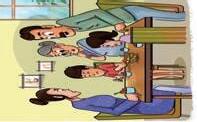




“Found it.”


to each of us after lunch. She served me first, as I was the most excited to taste them. As I took the first bite of the dessert, my face twisted into a funny expression: it was
“Sugar.” “Found it.” Oh no! I had grabbed the Unbelievable! Soon, the smell of the dessert filled the house. Once it was made, my mother used the ladle to serve two hot gulab jamuns unexpectedly salty! everyone excitedly . Within a few seconds, they were gagging
Before I could tell Mother about it, she had already served the salty treat to everybody. I watched dig into their bowls , coughing, and spitting.
Of course, I knew why.

I instantly came up with an idea to save the dessert. We served our salty with some vanilla ice cream. Now, it did not taste that bad!
I learnt an important lesson that day: always double-check your ingredients before you start cooking. We still talk about the time I accidentally made the saltiest gulab jamun ever, and it makes us all laugh a lot.







•


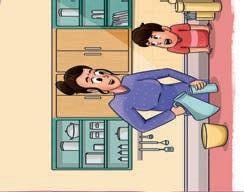

4:58:55 PM
12/13/2023



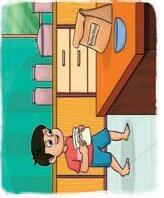


I decided to make a special Indian sweet treat for our family. We thought of options and finally decided to make Gulab Jamun . I excitedly searched for the recipe of gulab jamun online and found it easily. It looked easy to make as well. I happily going to help my mother make. Little did I know that something horribly funny was about to happen.
My mother started reading out the ingredients we needed for the sweet dish, and I began to look for them in the kitchen, one by one, and put them on the table.
“Whole-wheat.” Found it.”






the story aloud OR play the Talking Book
in the classroom.


into their bowls. Read the text with proper voice modulation and expressions.
You may pause at the annotations and ask these suggested questions.

After
What do you think will happen next in the story? / I think gulab jamuns
(The boy will make a big gulab jamun. many people will come to eat the and there will be none left.)
How do you think the gulab jamuns (The gulab jamuns jamuns will taste weird.)
After



After will taste now? will taste salty. / The gulab


After

How do you think the dessert will taste now? (It will taste sweet. / It will taste salty and sweet.)
After the Text
You may ask these suggested questions.


(Everyone coughed and spat because the taste of the was salty and bad. / Everyone coughed and spat because they did not like the taste of the gulab





Describe the boy’s experience of making the gulab jamuns (On a Sunday, the boy decided to make gulab jamuns putting the ingredients together on the table, and by mistake, he used salt in place tasted salty. He came up with an idea and served the

Why did everyone cough and spit? gulab jamuns jamuns.) with his mother. He was of sugar. The gulab jamuns gulab jamuns with vanilla ice cream.) on her birthday.)

3. What ingredients did you use to make the food? (We used bread, butter, tomatoes and cucumbers to make the sandwich. / We used some flour, milk, butter and cocoa powder to bake the cake.)


2. Did you ever cook anything with your mother? (I made sandwiches with my mother on Sunday. / I baked a cake with my mother




Oh no! I had grabbed the salt container by mistake.


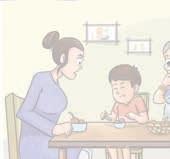

dessert filled the house. gulab jamuns to each of us after lunch. She served me first, as I was the most excited to taste them. As I took the first bite of the dessert, my face twisted into a funny expression: it was

Soon, the smell of the Once it was made, my mother used the ladle to serve two hot unexpectedly salty! . Within a few seconds, they were Of course, I knew why.
gulab jamun
Before I could tell Mother about it, she had already served the salty treat to everybody. I watched everyone excitedly dig into their bowls gagging, coughing, and spitting.







I instantly came up with an idea to save the dessert. We served our salty with some vanilla ice cream. Now, it did not taste that bad!
I learnt an important lesson that day: always double-check your ingredients before you start cooking. We still talk about the time I accidentally made the saltiest gulab jamun ever, and it makes us all laugh a lot.

• My Experience “Sugar.”








01_U24EN0410.indd 3






12/21/2023 7:04:45 PM (dig in.to theuh bowlz): to be hungry and excited to eat (ga.guhng): making sounds like you are about to vomit or cough grabbed (grabd): to quickly take something with your hands (lay.dl): a big spoon with a long handle unexpectedly (uhn.uhk.spek.tuhd.lee): something happens when you were not









record it.




Richa went to a fair with her family. Listen to her experience and record it.
Richa lost her brother, Rishi, at the fair. Listen to what happened next and

Richa tells us how her brother was found.
































Text Recall




The name of the chapter is— We read a story called where a boy shared his experience of making and accidentally mixing salt instead of sugar in it. He then came up with the idea of having the gulab jamuns vanilla ice cream. Through this story, we learnt how to share small experiences from our


We also learnt the phrase ‘dig into their bowls’, and the words ‘gagging’, ‘ladle’, ‘grabbed’ and ‘unexpectedly’; and how to use them in sentences.
Say: My Experience. A Salty Surprise, gulab jamuns, with with daily lives. how
Say: there
Through this story and the projects, we are learning to share descriptions of small experiences from our daily lives by adding relevant details to them. We talk about what happened, when it happened, who was there with us, and how the event took place. We also share feelings and emotions related to the experience.
Example from Text: us that he was making the



When the boy was describing his cooking experience, he shared with gulab jamuns with his mother. They were adding all the ingredients one by one, but by mistake, he added salt to the dessert instead of sugar. He mentioned that everyone in his family started gagging, coughing and spitting when they ate the first bite of the salty dessert. But finally, he came up with the idea of having gulab jamuns with vanilla ice cream to save them. Through this experience, he learnt to double-check the ingredients before adding them the next time.
Example from E-Speak 1: of during the experience.
1
Say: Richa’s
Now, I shall share Richa’s experience at the fair.
Instruct:
As a part of your homework project, you heard Richa share her experience about the visit to the fair. She mentioned that they were unable to find her brother at the fair and then finally, how they found him. She also expressed how she felt
Repeat the project 1A after me—Hello friends. Last Sunday, I went to a fair with my family. It was very crowded and noisy.
Instruct: an announcement.

Repeat the project 1B after me—We were so scared as we could not find my younger brother, Rishi, for a long time. We searched for him everywhere and even made

Instruct: Repeat the project 1C after me—A family heard our announcement on the loudspeakers. They found my brother crying in a corner and brought him to us. We are so thankful to them.


Hello friends. / Last Sunday, / I went to a fair / with my family. / It was









Think of a day when you lost something at school. Share your experience












I lost it during the … I felt … as I could not find it. I asked for



















































E & R
Explain: Instruct: Invite presentation.
Imagine that you lost something at school. You have to share the experience with your friends by describing what you lost, how you lost it and then finally, how you found it. Think for 2–3 minutes and then make your presentation. as many learners as possible for their presentations. Follow the E&R cycle for each
You may encourage the learners to share their presentation confidently with proper expressions and
Model Responses: 1. It was yellow in colour.



I lost my pencil at school.
I lost it in the library. I lost it during the recess. I felt upset as I could not find it. I asked for help from my friends. Later, I found it under the chair. I lost my notebook at school.
2. It was blue in colour. bag.
I lost it in the classroom. I lost it during the morning assembly. I felt worried as I could not find it. I asked for help from my classmates. Later, I found it in my bag.

3. I lost my watch at school. It was brown in colour. I lost it in the playground. I lost it during the sports period. I felt like crying as I could not find it. I asked for help from my teachers. Later, I found it in the playground.





Conclusion
Homework

2. Plan and Speak: at aloud, older family member.
You may ask the learners to bring a photo of the day, if they have one. Chapter 1
• My Experience

You have to record in the app about the most fun-filled day at school, 4 lines. Practise in front of the camera and make several attempts before submitting your final response. The best model response will be read outto the class. Think about an exciting day in your life. Write the details about the day. You may ask for help at home to do the work correctly. Practise saying the sentences aloud, again and again, in front of your friends or an
1. E-Speak 2: in 3–4 lines. Practise in front of the camera and out to the class.










We all enjoy our day in school learning new things with our friends. Tell us about your most fun-filled day at school. Talk about it in 3-4 lines.




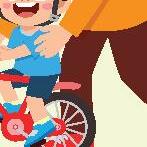



Ritam has come back from a swimming competition. Number his experience in the correct order.


I swam really fast, kicking my legs as hard as I could.

I celebrated this victory with my family and friends.

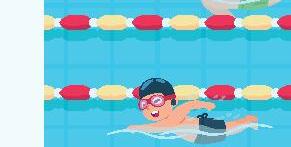


I was on the diving board, and my heart was beating fast.

When I reached the pool’s edge, I realised I had won the race.

I jumped into the pool, and the water was cool all around me.









the Gaming Zone activity to the learners—Swimming Competition. Read the details written about Ritam’s swimming competition. Now, read the sentences carefully and number Ritam’s experiences in the correct order by writing the numbers in the given boxes. You may ask these suggested questions.




What did Ritam say about the pool water? (He said that the water around him was cool.)

What did Ritam say about how he was feeling at the beginning of the swimming (Ritam said that when he was on the diving board, his heart was beating very fast.)
What did Ritam say about what he did after he jumped into the pool? (He swam really fast, kicking his legs as hard as he could.)
What did Ritam say about how he knew he had won the competition? (When he reached the pool’s edge, he realised that he had won the competition.)

How did Ritam celebrate his victory?
(He celebrated his victory with his family and friends.)



Say:

You did a digital project called ‘Fun-filled Day’, where you shared details about a
fun-filled day at school.
Instruct: Say:
Listen to my response to the project.
‘I had the most fun at school on Children’s Day. We were allowed to wear colourful dresses to school. We enjoyed playing different games planned by our teachers. We also had a yummy lunch served by the school. It was a day filled with fun and enjoyment.’ Now, you will listen to another response and repeat after me.
‘I had the most fun at school on Science Day. We did interesting science experiments. I loved taking part in the science quizzes. Our school also arranged a lecture by a scientist. She shared with us how she became a scientist. It was an inspiring story.’




You can also read a few of the best responses, submitted on the app by the learners, to the class and ask the learners to repeat those responses.




Now, share your experience with the class. Practise these lines at home in front of an elder.

















































Complete the sentences. family The most fun day of my life was I spent this day with my I enjoyed my day so much. It was so much fun because










Smile and look confident when you speak. Look at your friends and teachers when you speak. You can bring a photo of the day if you have one. the class. My Experience
Say:




Now, you will share with the class the most exciting day of your life. Share what day it was, with whom you spent the day, and what you did and ate that day. as many learners as possible for their presentations. Follow the E&R cycle for each
Invite many presentation.

You may encourage the learners to share their experiences loud and clear, with proper voice modulation. You may also remind the learners to show the photo of the day if they have it.
20 mins
You may read out one or two model answers between the learner’s presentations to give them more ideas about the vocabulary that can be used.
1.
Good morning, everyone!
The most fun day in my life was when I visited a fair.
I spent this day with my cousins. rides.
We also played many games.
I ate the ice cream that I like a lot.
I enjoyed my day so much.
It was so much fun because we went on many rides.
2.

Hello friends!

The most fun day in my life was when I learnt to ride a bicycle.
I spent this day with my parents.
It was so much fun because I learnt to cycle in two hours.
I rode the bicycle around the park.
I ate the chocolates that I like a lot. I enjoyed my day so much.
3.
Good morning, friends!

The most fun day in my life was when I travelled on a train.
I spent this day with my family. views.
I ate the sandwiches that I like a lot.
I enjoyed my day so much.

It was so much fun because it was my first train journey. I saw many scenic views.

Conclusion


2 mins
Say: In this chapter, we learnt to answer simple questions about our experiences and describe our experiences in brief.



Learning Objectives: Learners will be able to:
• retell important details about a person.
• share important and interesting things about oneself, in some details.


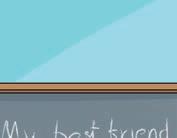


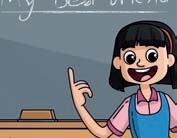
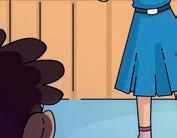
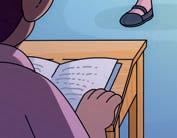









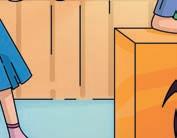






Cover Page Discussion
Say:
Instruct: picture picture.


Welcome to the Speak class. Today, we will read Chapter 2—About People. Look at the cover picture for one minute. Observe the things that you see in the
You may ask these suggested questions.





My Best Friend
Before the Text
Look at the page for one minute.
You may ask these suggested questions.



Read aloud the model description of the cover page. Say: On the cover page, we see a beautiful classroom. The topic is written on the board. The students have to describe their best friends. One girl is describing her best friend as kind, brave and intelligent.
Say: Go to page no. 10 of your content book. We will read the story—A Helpful Stranger. Instruct:
What do you see in the first picture? other passengers on a bus.)
2.
(I see different people on a bus. / I see an old woman, two men, a boy and a few


What can you say about the old woman? (The old woman is sitting on the front seat of the bus. She looks unwell or worried.)
3. What do you see in the second picture?

(I see that the old lady is unwell. The other people on the bus are helping her. The man in the blue shirt is calling an ambulance.)
We are going to read a story called The story is about a
You may explain what ‘describing words’ are to the learners. Describing words are words that give some detail about a person, place, animal or thing. For example: a black dog, a tall tree, a small ball, etc. Chapter 2




Explain: A Helpful Stranger. stranger who helps a fellow bus passenger in need. Now, let us begin reading. Instruct: Pay attention to how the narrator gives important details about the man who helped the old lady.










then he ran to the bus conductor. “Sir,” he said, “the lady in the second row has suddenly fallen ill. Where is the nearest stop?” “Hasampura. About ten minutes.” Everyone started to . He took out his mobile phone and dialled the nearest hospital. “ ? I am on the bus from Jaipur to Phulera. An elderly passenger is not well. She might have a heart problem. Please send an ambulance to meet us at the Hasampura bus stop. We are ten minutes away. My name is Divyanshu Gaur. Thanks.”
panic . The young man, however, was calm Emergencies effectively



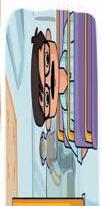

The next day, my father pointed to the newspaper, “Isn’t this the helpful man from yesterday?” I looked at the newspaper article. There was a photograph of him. Below, it was written “A young caring man with quick thinking saves elderly woman’s life. Calls an ambulance ahead of time by staying calm.” I would like to be like that young man when I grow up. He was friendly, kind, and caring. He remained calm and acted quickly and . He is a very good role model!





•





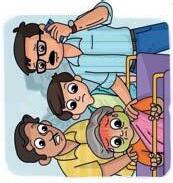
bus with my father. The bus was not quite full. Among others, there was an elderly woman in the second row. There was also a young man wearing spectacles next to me. He seemed very friendly. Suddenly, I heard the elderly woman cry out. She was very pale . She started sweating and breathing heavily. I got scared. What was happening? My father and I started to get up, but we didn’t know what to do. The young man next to me was very quick to act. He jumped up and asked the woman. “What is it, ma’am?” She was clearly in pain. The young man thought for a moment, and








the story aloud OR play Talking Book in the classroom.
the

You may pause at the annotations and ask these suggested questions.

After 1


What happened suddenly to the old woman?

After done in such a situation? 102 ambulance.)
How did the narrator react? What would you have
(The narrator and his father got up from their seats, but they did not know what to do. In such a situation, I would stay calm and call 102 for an
After bus stop.)
What was the helpful passenger’s name?

(Suddenly, the narrator heard the elderly woman cry out. She was very pale. She also started sweating and breathing heavily.)


What specific details did he give to the hospital emergency services?
After quickly and effectively.)
What specific qualities did Divyanshu Gaur have?



(The helpful passenger’s name was Divyanshu Gaur. He gave the hospital emergency services all the specific details like his name, the bus route; the condition of the old lady and that they needed an ambulance at the Hasampura
You can rephrase the answers in complete sentences based on your learners’ responses. He remained calm and acted quickly and effectively.
You may ask these suggested questions.


2.
What happened to the old lady in the second row?
3. fek.tuh.vlee. You may stress on the syllable in bold, ‘fek’.
(Divyanshu Gaur was friendly, kind and caring. He remained calm and acted
(The old lady in the second row suddenly went pale and started sweating and breathing heavily. She had fallen ill.)
Which specific qualities do we need to become a role model?
(To become a role model, we need to have specific qualities like friendliness, kindness, caring, calmness and quickness of thought and action.)
Have you ever helped anyone? How?






(Yes, I have helped my friend when he fell down while playing football and fractured his wrist. I helped him go to the school sick room. Then, I informed our PE teacher and class teacher. After that, I stayed by my friend’s side.)










“Hasampura. About ten minutes.”






then he ran to the bus conductor. “Sir,” he said, “the lady in the second row has suddenly fallen ill. Where is the nearest stop?”
Everyone started to . The young man, however, was . He took out his mobile phone and dialled the nearest hospital. “ ? I am on the bus from Jaipur to Phulera. An elderly passenger is not well. She might have a heart problem. Please send an ambulance to meet us at the Hasampura bus stop. We are ten minutes away. My name is Divyanshu Gaur. Thanks.”
effectively
The next day, my father pointed to the newspaper, “Isn’t this the helpful man from yesterday?” I looked at the newspaper article. There was a photograph of him. Below, it was written “A young caring man with quick thinking saves elderly woman’s life. Calls an ambulance ahead of time by staying calm.”



I would like to be like that young man when I grow up. He was friendly, kind, and caring. He remained calm and acted quickly and . He is a very good role model!





(kaam): a person who is quiet and not nervous or upset (uh.fek.tuh.vlee): an action that proves successful (ih.muh.juhn.seez): the part of the hospital that deals with patients who need urgent care (payl): looking ill (pa.nuhk): to suddenly feel a lot of fear • About People panic calm










Say: with them.
Read aloud
Instruct:


Now, we will understand the meaning of some words and learn to make sentences the first keyword, its meaning and the example sentence. Repeat the word after me—calm (kaam).
Instruct:
Instruct: Repeat

Repeat the meaning after me—a person who is quiet and not nervous or upset. Repeat the sentence after me—Priya was very calm during the exam. this process for the other keywords as well.


PronunciationMeaning

Pronunciation Meaning vlee successful complete the project. ih.muh.juhn. seez and night.
uh.fek.tuh. an action that proves The group worked effectively to the part of the hospital that deals with patients who need urgent care

payl looking ill
The hospital emergencies work all day
Raman looked pale after lunch break, so we took him to the sick room.
pa.nuhk to fear The they heard loud crackers.
.nuhkto suddenly feel a lot of fearThe pet dogs started to panic when
You may break the sentences into meaningful chunks for the learners to repeat them without difficulty. For example: The group worked / effectively to / complete the project.


E & R
Say: Now, I will call you, one by one, so that you can present your sentences for the keywords. Instruct: Make some sentences with the word ‘calm’ and tell them to me. Repeat this process with all the keywords.
Model Responses:
1. Ranjita remained
2. Binod removed the stains from his white shoes.
3. Ankit called the hospital about an accident.
4. Vrinda looked
Conclusion

calm on the giant wheel. effectively white emergencies pale and tired. panic
5. The children started to when they saw a monkey at the class door.

It was about an old woman falling
Say: Today, we read a story called A Helpful Stranger. ill on a bus. A helpful stranger, Divyanshu Gaur, did not panic like the narrator and other passengers. Instead, he remained calm and called the nearest hospital. In this chapter, we learnt to describe people with important and specific details. We also learnt the words ‘calm’, ‘effectively’, ‘emergencies’, ‘pale’ and ‘panic’; and how to use them in sentences.
Homework
Say: Practise the E-Speak 1 projects on page no. 12. Learn to speak about people with important and interesting details by listening to and repeating the projects given in the app.







record it.





Rohan and Sohan are best friends. Listen to some details about them and



Sohan describes his best friend, Rohan. Listen to the description and record it.

Rohan gives some description about Sohan.




























Text Recall



Say: About People.

The name of the chapter is— In the last class, we read a story named It was about an old woman falling ill on a bus. A helpful stranger did not panic and remained calm. He called the nearest hospital, gave important details to them, and asked for an ambulance. In this chapter, we learnt to describe people and situations with important and specific details. We also learnt the keywords ‘calm’, ‘effectively’, ‘emergencies’, ‘pale’ and ‘panic’; and how
A Helpful Stranger. ‘pale’ to use them in sentences.


Say:
Through this story and the projects, we are learning to describe people and situations with important and specific details. We use describing words to give details about a person, place, animals or things.
Example from Text:
The helpful stranger gives important details to hospital emergencies like the route, bus stop and condition of the lady. The narrator uses words like pale and
elderly to describe the lady. thinker. and

The narrator describes the helpful stranger using words like calm, helpful, caring and quick
These are describing words that are used to give details and tell us the qualities of a person.


Example from E-Speak 1: E-Speak 1
Say:
As a part of your homework project, you heard how Rohan and Sohan describe each other. They described the looks and qualities of each other. We are learning to use describing words to talk about people.
Now, I will tell you how Rohan and Sohan give details about each other.
Instruct: every evening.
Instruct:

Repeat the project 2A after me—Rohan and Sohan are best friends. They both study in the 4th grade at Meadow Public School. They are neighbours and play together
Repeat the project 2B after me—Rohan is a thin boy. He wears spectacles. His hair is shiny black. He is a very helpful boy. He likes to help his friends with homework. Repeat the project 2C after me—Sohan is tall and has brown-coloured eyes. His hair is curly. He is honest and kind. He likes to read about history.
Instruct: Sohan is tall / and has / brown-coloured eyes. / His hair is curly. / He is /












He/She is … years old.
He/She is in … grade.
He/She lives in …


Boost Your Speaking

My best friend’s name is …

His/Her hair colour is …





He/She is very …








His/Her favourite sport is …









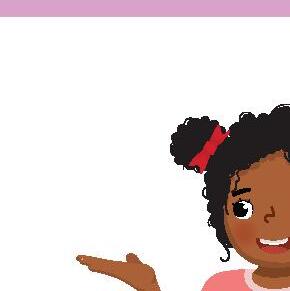



























Explain:
Now, you have to describe your best friend to the class. Fill in the details to describe him/her. You may use the words in the help boxes to complete your description. Think for 2–3 minutes and then make your presentation. as many learners as possible for their presentations. Follow the E&R cycle for each
Instruct: Invite presentation.



You may explain the meaning of the words in the help boxes to the learners so that they can use
You may read the model responses at the beginning or in between the learners’ presentations. This will help them to express their ideas clearly and confidently.
Model Responses:
1. Hello, everyone! is
My best friend’s name is Romana. She is nine years old. She is in the 4 grade.
She lives in New Delhi. talkative. Her
2. She lives in Gujarat.
Her hair is black. She is very talkative.Her favourite sport is cricket. One thing that I like about her is that she is very helpful. Good morning, everyone!



My best friend’s name is Udita. She is nine years old. She is in the 4 grade.
Her hair is brown. She is very friendly. Her favourite sport is hockey. One thing that I like about her is that she is very kind.
3. Good afternoon, friends! the He lives in Agra.
My best friend’s name is Vidhaan. He is nine years old. He is in the 4 grade.
His hair is black and brown. He is very wise. His favourite sport is badminton. One thing that I like about him is that he is very honest.
Homework
1. E-Speak 2: the class.


You have to record in the app about your favourite hobby and why you like it in 3–4 lines. Practise in front of the camera and make several attempts before submitting your final response. The best model response will be read out to

2. Plan and Speak:
You have to introduce yourself to the class. Fill in the sentences given on page no. 15 to introduce yourself. Practise saying your introduction aloud, again and again, in front of your older family members.












We all like to spend our time doing the things we like the most. Engaging in hobbies brings us joy and helps us relax. Tell us about your hobby and





Arrange the letters to make the words. One has been done for you.









U24ENCB_Grade4.indb 14
















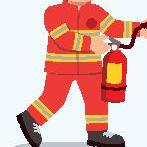














12/13/2023 4:59:30 PM




the Gaming Zone activity to the learners—
Introduce Write the Words. Say: helps us make the word. Show the example


Children, it’s now time for a fun game! You have to rearrange the letters to write the correct words. Let us find out what these letters mean when we arrange them correctly. For example, the first word is BRAVE. The picture of the firefighter and the word in the box given in the book.


Instruct: this quality.)
First, read the jumbled letters. Then, look at the picture beside the blank. After that, read the words given in the boxes. Finally, write the correct word in the blank. You may ask these suggested questions.
What is the first jumbled word? Which two people have this quality?
(The first jumbled word is BRAVE. Firefighters, policemen, doctors and nurses have

2. this quality.)
What is the second jumbled word? Do you have this quality?
(The second jumbled word is FRIENDLY. Yes, I have this quality. / No, I do not have

3. 4. 5.
What is the third jumbled word? Who in your family has this quality?
(The third jumbled word is SMART. My mother has this quality. She is smart.)
What is the fourth jumbled word? Does your best friend have this quality?
(The fourth jumbled word is HELPFUL. Yes, my best friend has this quality.)



What is the fifth jumbled word? Name one person who has this quality.

(The fifth jumbled word is DARING. I think Bachendri Pal, the first woman to climb Mount Everest, has this quality.)
Say: called ‘About ,
Instruct: Listen
Listen to my response to the project.

You did a digital project called‘About Myself’ where you told us about a hobby you like the most and why you like it.
‘My favourite hobby is drawing and colouring. I like to draw and colour animals, plants, objects and places that I see around me. I like to fill all my drawings with bright colours!’
Say: another
Now, you will listen to another response and repeat after me.
‘I like playing cricket and spending time outdoors. It is so much fun to work with the team to get the highest score. I also love to run around the park with my friends. Thank you!’



I like / playing cricket / and / spending time / outdoors. It is so much fun / to work



You can also read a few of the best responses, submitted on the app by the learners, to the class and ask the learners to repeat those responses.



Talk about yourself in front of your friends. Practise these sentences in front of a family member.









































One special quality about me is that in my free time because introduce yourself. What will you tell everyone about yourself? Write about it and present your lines in the class. Complete the sentences about yourself.





person.





My name is I live in I am My birthday is on I am a very I like to I do not like to I like to • About People











Say: Invite many presentation.
Now, it is your turn to introduce yourself to the class. as many learners as possible for their presentations. Follow the E&R cycle for each
You may encourage the learners to stand straight and maintain eye contact with the audience while







Model Responses: 1. 2. 3. Zubair. on 19 August. I am a very hardworking person. I like to eat chole bhature fastest to it makes my mind sharp.

Hello everyone! My name is Shraddha. I live in Lucknow. I am nine years old. My birthday is on 20 October. I am a very fit person. I like to dance and jog. I do not like to draw. One special quality about me is that I can do Kathak dance. I like to dance in my free time because I like to move to musical beats. Hello everyone! My name is Piyush. I live in Ladakh. I am nine years old. My birthday is on 29 February. I am a very caring person. I like to play badminton and hide-and-seek. I do not like to sing. One special quality about me is that I can climb trees. I like to play badminton in my free time because it keeps me active. Hello everyone! My name is Zubair. I live in Agra. I am nine years old. My birthday is I do not like to eat rice. One special quality about me is that I can do the fastest mathematics calculations in my class. I like to study maths in my free time because



Conclusion


Say: In this chapter, we learnt how to tell others important and specific details about people, including ourselves. Now, we can confidently describe other people and ourselves.




Asking riddles

Learning Objectives: Learners will be able to:
• understand and solve short riddles.
• ask riddles with appropriate body language and expression.




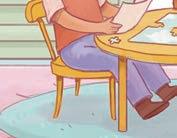






Asking riddles
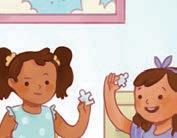







Cover Page Discussion
Say:
Instruct: picture


Welcome to the Speak class. Today, we will read Chapter 3—Fun With Riddles. Look at the cover picture for one minute. Observe the things that you see in the picture. You may ask these suggested questions.
Where are the children in the picture?
(The children are in the playroom of a house.)



What are the children doing?
(The children are sitting and playing a game.)
What game are the children playing?
(They are solving a puzzle.)
What is the boy looking at?
(The boy is looking at a sheet of paper that may have the solution to the puzzle.)
the model description of the cover page.


On the cover page, we see a beautiful room. The walls are decorated with paintings and pictures. There are three children. They are sitting at a round table and solving a puzzle together. The boy is looking at a sheet of paper that will help them solve the puzzle.

Go to page no. 18 of your content book. We will read the story—Birthday Riddles. Look at the page for one minute. You may ask these suggested questions.

What do you see in the first picture?
(I see balloons, children, cake and cookies in the first picture.)
What are the children doing?

What is the boy in the middle doing?
(The boy in the middle is blowing out the candles.)

birthday song.) 3. Birthday Riddles.
In the second picture, what things are there on the table?



(They are celebrating a boy’s birthday. / They are clapping. / They are singing a

(There is a vase, a glass and a slice of cake on the table.)

We are going to read a story called It is about a boy, Atul and how he celebrates his birthday with his friends. He has to solve a few riddles to find his birthday present. A riddle is a puzzling question which has a clever or amusing answer.
Pay attention to how Atul tries to understand and solve the riddles to find his
• Fun With Riddles







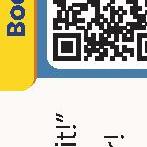

“I have four legs, and I can be slanting or straight. My basic job is to support some weight.
Atul looked around. “It’s a chair: It has four legs. It can have a slanting back or a straight one, and it does support our weight when we sit on it!” He started picking up the cushions on the chairs one by one. Oh, dear! and large in most cases, Soft above and hard at the bases. But be careful; there might be some dust to be seen!



There it was, another riddle! “I am always comfortable What am I?” stunned
We hope you liked the present!”
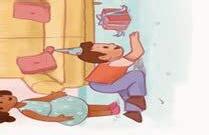




•



“The sofa!” yelled Atul. “Of course, it’s comfortable and large and gets dusty too.” He dropped to his knees and looked under the sofa. There it was a beautifully wrapped flat box! He pulled it out and quickly unwrapped it. He was It was a computer game, the latest! His friends cheered and laughed, “Happy Birthday, Atul! 12/13/2023
4:59:52 PM What am I?”

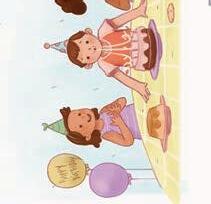



birthday cake! “Happy Birthday! Happy Birthday!” his friends chanted Adi stepped forward. “Now, do you want a birthday present?”

“Haha! You will have to solve a few riddles for “Pull me out, and there you’ll see, Steel or silver pieces placed in me. Pointed, sharp, round, or blunt They are tools to eat with. What am I?”
“Ah, it is the cutlery drawer!” Atul called out excitedly and ran to the cupboard. He pulled out the drawer, thinking he would find his present. His face fell. “Another riddle!”





the


You may build excitement when asking riddles given in the text through lots of actions, expressions and voice modulation. Repeat the riddles a few times until all the learners understand it.
You may pause at the annotations and ask these suggested questions.



Whose birthday are the children celebrating? (The children are celebrating Atul’s birthday.)
What do you think is the answer to this riddle?
(I think it is a drawer / kitchen shelf.)


You can rephrase the learner’s responses regarding the riddles into complete sentences. For example: A chair / has four legs / with a slanting / or straight back / and can support / weight. the story aloud OR play Talking Book in the classroom. After After After



What has four legs with a slanting or straight back and can support your weight? (A chair has four legs with a slanting or straight back and can support weight.)
Where did Atul find his present?
(Atul found his present under the sofa.)



After the Text
You may ask these suggested questions.

Which riddle did you like the most?

(I liked the drawer / chair / sofa riddle the most.)
2. riddles on my own.)
Were you able to solve the riddles on your own?

3. Do you know any other riddles? is my name.)

(Yes, I was able to solve the riddles on my own. / No, I was not able to solve the

Where did Atul look for his gifts in the story?
(Atul looked for his gift in the cutlery drawer, on the chair and under the sofa.)


(Yes, my favourite riddle is—what is yours, but mostly used by others? The answer







“I have four legs, and I can be slanting or straight. My basic job is to support some weight.
Atul looked around. “It’s a chair: It has four legs. It can have a slanting back or a straight one, and it does support our weight when we sit on it!” He started picking up the cushions on the chairs one by one. Oh, dear!
There it was, another riddle!
comfortable and large in most cases, Soft above and hard at the bases.



But be careful; there might be some dust to be seen!


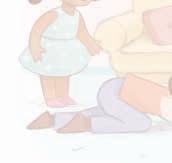





(bluhnt): without a sharp edge or point chanted (chaan.tuhd): sang or shouted the same words many times comfortable (kuhm.fuh.tuh.bl): makes you feel relaxed when you sit on it (kuht.luh.ree): knives, forks and spoons used for eating food stunned (stuhnd): very surprised or shocked
• Fun With Riddles




“I am always . It was a






“The sofa!” yelled Atul. “Of course, it’s comfortable and large and gets dusty too.” He dropped to his knees and looked under the sofa. There it was a beautifully wrapped flat box! He pulled it out and quickly unwrapped it. He was stunned computer game, the latest! His friends cheered and laughed, “Happy Birthday, Atul! We hope you liked the present!” U24ENCB_Grade4.indb






Say: with them.
Read aloud
Instruct:


Now, we will understand the meaning of some words and learn to make sentences the first keyword, its meaning and the example sentence. Repeat the word after me—blunt (bluhnt).
Instruct:
Instruct:

Repeat the meaning after me—without a sharp edge or point. Repeat the sentence after me—My pencil is blunt so I cannot write with it. Repeat this process for the other keywords as well.


PronunciationMeaning
Pronunciation Meaning
chanted chaan.tuhd sang

Sentence
comfortablekuhm.fuh.tuh.blmakes you feel relaxed when you sit on it
chantedchaan.tuhdsang or shouted the same words many times I chanted a prayer in the morning.
comfortable kuhm.fuh.tuh.bl makes comfortable. cutlery kuht.luh.ree knives, home.
stunned shocked I me a surprise.

The chair in my room is very cutlerykuht.luh.reeknives, forks and spoons used for eating food
We have bought new cutlery for our very surprised or shockedI was stunned when my parents gave
You may break the sentences into meaningful chunks for the learners to repeat them without difficulty. For example: I was stunned / when my parents / gave me / a surprise.


Repeat this process with all the keywords.
Model Responses:
E & R blunt chanted comfortable to sleep in.
Say: Now, I will call you, one by one, so that you can present your sentences for the keywords. Instruct: Make some sentences with the word ‘blunt’ and tell them to me.
1. It is difficult to cut vegetables with a knife.
2. We chanted slogans of Save the Earth in the morning assembly.
3. My bed is very
4. I taught my younger brother to use
taught cutlery. was stunned
Conclusion

5. I was when my grandparents visited me.

Say: Today, we read the story called Birthday Riddles. celebration. We learnt how to ask riddles with expressions and how to solve them. We also learnt the words ‘blunt’, ‘chanted’, ‘comfortable’, ‘cutlery’ and ‘stunned’; and how to use them in sentences.
Homework
We read about Atul’s birthday

Say: Practise the E-Speak 1 projects given on page no. 20. Learn to say the riddles by listening to and repeating the projects given in the app.










riddle and record it.




Apurva likes to ask riddles. She has made a riddle on the clock. Listen and record it.






Apurva sees an aeroplane in the sky and makes a riddle on it. Listen to her

Apurva creates a riddle on a pair of




















Text Recall



Say: Fun With Riddles. called Birthday Riddles.
The name of the chapter is— In the last class, we read a story In this story, we read about Atul’s birthday celebration. We learnt how to ask, understand and solve riddles. We also learnt the keywords ‘blunt’, ‘chanted’, ‘comfortable’, ‘cutlery’ and ‘stunned’; and how to use them in sentences.



Say:
Through this story and the projects, we are learning to understand riddles and how to solve them. We are also learning to ask riddles properly. A riddle asks about an object, place or person by mentioning its features and qualities in a sentence, and the person it is asked to, needs to solve it by understanding the features, and identifying what it is.
Example from Text: beautiful present under it.
In the text, Atul had to solve riddles to find his birthday present. Atul’s friends asked him various riddles about daily objects like cutlery drawer, chair and sofa. They asked him—”what is soft, large, and comfortable in most cases but has a hard base? Dust can also be seen on it.” Atul understood that it was a sofa and found a
We learnt that when we create a riddle, we should mention the qualities and features of the object we are asking about.
Example from E-Speak 1:


As a part of your homework project, you heard Apurva tell us the features of some objects, what they look like, and their functions. These clues helped us guess the objects. She told us riddles about a clock, an aeroplane and a pair of scissors.
E-Speak 1
Say:
Now, I shall speak about the riddles created by Apurva.

Repeat the project 3A after me—You can find me hanging / On your favourite wall. I have two hands / But I can’t pick things that fall. Who am I? (Pause)
Instruct: Repeat the project 3A after me—You can find me hanging / On your favourite I am a clock!
Repeat the project 3B after me—I am not a bird, but I can fly. /When children see me in the sky, they wave their hands and say, “Bye-bye!”. Who am I?
Instruct: / When children (Pause) I am an aeroplane!
Instruct: (Pause)

Repeat the project 3C after me—I am used to cut paper, / I am used to cut hair. I am used to cut your clothes, / And one of me is a pair. I am a pair of scissors.

You may inform the learners that it is important to pause after reading riddles so that the listeners can respond.


You can find me hanging / On your favourite wall. / I have two hands /












Choose any of the objects given below. Add TWO lines more to make an interesting riddle. Present your riddle in the class.
































































You can also use rhyming words in your riddle.











E & R
Explain: Instruct: Invite presentation.


You have to choose any one of the objects given. The first two lines of the riddle have already been given. You have to add two more lines to complete the riddle and make it interesting. You need to present your complete riddle to the class. Think for 2–3 minutes and then make your presentation. as many learners as possible for their presentations. Follow the E&R cycle for each

You may encourage the learners to use rhyming words to make their riddles effective and in tune.
Model Responses:
1. Good afternoon! (Pause)
It is a candle.
4. (Pause)
2. Hello everyone!
It makes the room bright, Use a matchbox to light. Blow it out, and make a wish, Gives moments to cherish. It fills the room with colour
On your birthday. If it is let loose, It will fly away. (Pause)
It is a balloon.
3. Good morning, friends! I can close big doors With my strong arms. You need a key To open me fast. (Pause)
I am a lock.

Homework
1. E-Speak 2: read out to the class.


Hello everyone! Listen to my riddle It is hard and round, In a jeweller’s shop it is found. Worn on a finger, a precious thing Can be shiny or bling.
It is a ring.
5.
Good morning, friends! To play with me, Beat me with sticks.
And I promise I won’t cry. (Pause)
I am a drum.
6. (Pause)


Hello friends! Listen to my riddle. You use it in rainy season, And sometimes in summer. It is not a coat, nor is it a hat, But it shields you, wherever you’re at.
It is an umbrella.

You have to record in the app what your favourite animal looks and sounds like, in 3–4 lines. Listen to the stimulus given in the app, which will help you enhance your response. Practise in front of the camera and make several attempts before submitting your final response. The best model response will be
2. Plan and Speak: in
You have to choose a bird or an animal given on page no. 23 and make a riddle on it. You may ask for help at home to create the riddle. Practise saying the riddle loudly in front of your friends or family.







Animals are interesting creatures. They have features that make them different from one another. Tell us in 3-4 lines what your favourite animal looks and sounds like.
















Match the riddle with the correct animal picture. One has been done for you.


I am an animal with a long trunk. And I am too big to be in your house. Who am I?
My fur is white, and I love to hop. When I see a carrot, I don’t stop.
Who am I? nuts. Who am I?
I live on trees with falling leaves. You will find me always near the

My name starts with the letter ‘Z’. pretty. Who am I?
























the Gaming Zone activity to the learners—
Introduce Animal Riddles. Say:
Show the example Instruct:
Let us read the riddles and match them with their correct animal pictures. given in the book.
Now, match the other riddles on the left with the animal pictures on the right. You may ask these suggested questions.




Say:
You did a digital project called ‘Guess My Favourite’, where you told us about what your favourite animal looks and sounds like.
Instruct: Listen Say: another
Listen to my response to the project.



‘My favourite animal is a cow. It is white, brown or black in colour. It has a large body with four legs. It also has a tail with hair at the end and makes a ‘moo’ sound.’
Now, you will listen to another response and repeat after me.
‘A dog is my favourite animal. Dogs are of different sizes according to their breeds. They also have a furry coat of different colours. They have four legs with paws and a tail.
They make a ‘woof’ sound when they bark.’




You can also read a few of the best responses, submitted on the app by the learners, to the class and ask the learners to repeat them.






Ask the riddle to your family members. Say the riddle with a lot of expressions.























Plan and Speak


The Final Show

Ask your riddle to your classmates. Let them guess the answer. You can also choose any other animal or bird. Say only the first three lines of the riddle at the beginning, and Let some of your friends guess the answer first, then tell present it in the class. I live in I can make a I cannot Who am I?
Choose a bird or an animal and write a riddle on it. Practise saying your riddle and




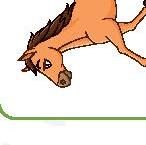




Write a short riddle on the animal or bird you chose.












Say:
friends to answer it correctly. Invite many presentation.
Model Responses:
1.
Now, you will present your riddle about a bird or an animal in the class and ask your as many learners as possible for their presentations. Follow the E&R cycle for each


Hello friends! Listen to my riddle. I am brown in colour. I have large eyes. I live in trees. I can make a ‘hoot’ sound.
I cannot sleep at night. Who am I? (Pause)
I am an owl.
2. Good morning, friends! Who am I? (Pause)
I am orange in colour. I have black stripes. I live in the forests. I can make a ‘rawrrr’ sound. I cannot fly.
I am a tiger.
3. Who am I? (Pause)
Good morning, everyone!
I am green in colour. I have a large, curved beak. I live in trees. I can make a ‘talking’ sound. I cannot swim.

I am a parrot.
5. Hello friends!


I am yellow in colour. I am the king of the jungle. I have hair around my face. I live in jungles. I can make a ‘rawrr’ sound.
I cannot fly. Who am I? (Pause)
I am a lion.
6. I cannot swim. Who am I? (Pause)
Good evening, friends!
I am yellow and brown in colour. I have a tall neck. I live in jungles. I can eat leaves from tall trees. I can run very fast.
I am a giraffe.

4. Hello friends!
I am blue and green in colour. I have colourful feathers. I live in forests, on farms or in agricultural fields. I can make a ‘scream’ sound. I cannot jump high.
Who am I? (Pause)
I am a peacock.
7. Hello friends! Who am I? (Pause)

I am green in colour. I have big round eyes. I live in ponds and lakes. I can make a ‘croak’ sound. I cannot run fast.
I am a frog.
8.
Good afternoon, friends!
I am brown, black or white in colour. I have four legs. I live in a stable. I can make a ‘neigh’ sound. I cannot breathe through my mouth.
Who am I? (Pause)


I am a horse.

Conclusion


Say: In this chapter, we learnt to understand, solve and ask riddles. Now, we can have fun with our friends by asking them lots of riddles!



Sharing feelings

Learning Objectives: Learners will be able to:
• share some details about events.
• share personal feelings.



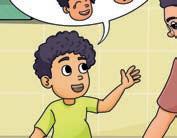
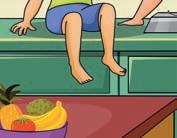

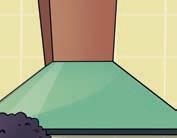




Sharing feelings


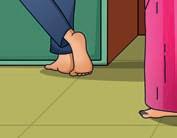





Cover Page Discussion
Instruct: picture


Welcome to the Speak class. Today, we will read Chapter 4—All About Feelings. Look at the cover picture for one minute. Observe the things that you see in the picture. You may ask these suggested questions.

What do you see in the picture?


(I see a boy sitting on the kitchen counter. / I see a family in the kitchen. / I see a woman holding a bag full of vegetables.)


What is the boy doing in the picture?
(The boy is talking to his father / family / parents.)
Read the title carefully. Now, what do you think the boy is telling his parents? (I think the boy is sharing his feelings with his parents.)

What is the father doing in the picture?
(The father is listening to the boy. / The father is cooking.)
the model description of the cover page.


On the cover page, we see a family together in the kitchen. The father is cooking. The mother is holding a bag full of vegetables. The boy seems to be sharing about his day and his feelings with his family. His parents are listening attentively.


Go to page no. 26 of your content book. We will read the story—Letter to a Friend. Look at the page for one minute. You may ask these suggested questions.

What do you see in this picture?
(I see four people in the picture. / I see a man, a woman, a boy and a girl in the picture. / I see a family of four in the picture.)
What is the man doing in the picture?
(The man is talking to his family in the picture.)
Look at the man’s face. How do you think he is feeling?
(I think the man is feeling happy / excited / joyful.)





Look at the family’s expressions. How do you think they are feeling?
(I think they are feeling worried or shocked to hear what the man is sharing.)
Letter to a Friend.

We are going to read a story called In this story, a girl named Naina writes a letter to her friend Abha. Naina shares her feelings about her father’s transfer to Hyderabad. This story is written in a letter format. Now, let us begin reading.
Instruct:
Pay attention to the words and phrases that Naina uses to share her feelings with Abha.








Mom tried to calm us down. She said that not everything will change. She told us that we will be taking all our furniture, clothes and books with us. And most importantly, we will have each other. She also said of places to I am not too excited about moving, but what Mom said is also true. and starting a new life there, I feel happy for him. But I honestly hope I like the new
plenty visit. It may not be all that bad. When I see that my Dad is happy about the transfer city and the new house. Do write back soon and let me know what you think.

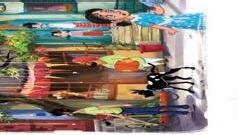

Your loving friend, Naina •










Alwar–301001
Dear Abha, upset today. I wanted to I am still shocked skating lessons, and say goodbye to our house. I dislike
I hope you are doing well. I am writing to tell you that I am When Dad came back from the office this evening, he told us that his company is transferring him to Hyderabad. We all have to move there by the end of this month. . Can you believe it? We have less than a month to shift to a new city. That means I will have to move away from all my school friends, stop my the idea of making new friends in the new school. What if the students and teachers don’t like me? What if nobody wants to be friends with me? My brother Sagar is also worried about all these things. He has to leave the football team now. Everything will be different!





the





While reading the text aloud, you may speak with proper expressions. You may modulate your tone so that the learners can understand the different feelings mentioned in the text.
You may pause at the annotations and ask these suggested questions.
After team.)
How does Sagar feel about leaving his football team? (Sagar feels worried about leaving his football

How does Naina feel about her father’s transfer to Hyderabad? (Naina feels upset about her father’s transfer.)



After down? each

What does Mom say to calm the children down? (Mom says that not everything will change and they will have each other. / Mom says that they will take their furniture, clothes and books with them.)
How does Dad feel about their new life in Hyderabad? (Dad feels happy about their new life in Hyderabad.)



After the Text
After Who wrote the letter to whom?



You may ask these suggested questions.

(Naina wrote the letter to her friend Abha.)
2. Why did Naina write the letter?
(Naina wrote the letter to share her feelings with Abha.)
3. With whom do you share your feelings? my feelings with my friends.)



4. Sagar feels worried about leaving his football • All About Feelings

(I share my feelings with my parents. / I share my feelings with my siblings. / I share

Tell us about the time you were upset. Whom did you share your feelings with? (I was upset when my father did not come in time for my birthday party. I shared my feelings with my siblings. / I was upset when my mother did not take me to the amusement park. I shared it with my parents when we sat down for dinner.)
4 the story aloud OR play Talking Book in the classroom.


For open-ended questions based on the learners’ realities and experiences, you can rephrase their responses into complete sentences. For example: I share my feelings with my friends.




Mom tried to calm us down. She said that not everything will change. She told us that we will be taking all our furniture, clothes and books with us. And most importantly, we will have each other. She also said that Hyderabad is famous for its food and there are of places to visit. It may not be all that bad.
Do write back soon and let me know what you think.
Your loving friend, Naina




I am not too excited about moving, but what Mom said is also true. When I see that my Dad is happy about the and starting a new life there, I feel happy for him. But I honestly hope I like the new




• All About Feelings plenty transfer city and the new house.


(dis.lyk): to not like something plenty (plen.tee): many shocked (shawkt): surprised because something unexpected has happened transfer (trans.fur): move from one place to another for work (up.set): unhappy



















Say: with them.
Read aloud
Now, we will understand the meaning of some words and learn to make sentences
Instruct: lyk).
Instruct: Instruct:
the first keyword, its meaning and the example sentence. Repeat the word after me—dislike (dis. Repeat the meaning after me—to not like something. Repeat the sentence after me—I dislike people who are rude to others. Repeat this process for the other keywords as well



PronunciationMeaning
Pronunciation Meaning

plentyplen.teemany
plenty plen.tee many shawkt surprised because something
transfer trans.fur move from one place to another for work upset up.set unhappy


I have plenty of storybooks in my house. Riya was shocked to learn about the English test that was planned for the next day.
My best friend, Tina, and her family will transfer to Bengaluru.
Tanya is upset as she could not participate in the badminton match.

You may enact the words ‘shock’ and ‘upset’. You may ask the learners to copy the expressions after you.

Repeat
this process with all the keywords.
Model Responses:
I dislike
1. sandwiches with cucumber in them.
The class collected plenty
2. of clothes for donation.
3. to see a lizard in his bag.
4. to New Delhi.
Conclusion

Agram was shocked see My best friend’s family will transfer Mridul was upset in
5. after his favourite team lost the table-tennis match.

Say: Now, I will call you, one by one, so that you can present your sentences for the keywords. Instruct: Make some sentences with the word ‘dislike’ and tell them to me.
Say: Today, we read a story called Letter to a Friend. It is in a form of a letter written by Naina to her friend Abha. In that letter, Naina shared her feelings with her friend. We understood how to share our feelings with others. We also learnt the words ‘dislike’, ‘plenty’, ‘shocked’, ‘transfer’ and ‘upset’; and how to use them in sentences.
Homework
You may break the sentences into meaningful chunks for the learners to repeat them without difficulty. For example: Tanya is upset / as she could not / participate in / the badminton match. Chapter 4


Say: Practise the E-Speak 1 projects given on page no. 28. Learn to share your feelings by listening to and repeating the projects given in the app.












Vivek shares how he feels taking care of the animals around him. Listen and record it.




Vivek talks about how scoring well in exams makes him happy. Listen and record it.









Vivek talks about how he feels when he spends time with his family and friends. Listen and record it.

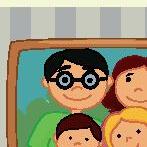


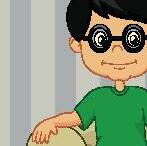

















Text Recall
The name of the chapter is—


Say: All About Feelings. named Letter to a Friend. Naina share details about events.
In the last class, we read story a It is a letter written by Naina to her friend Abha, where she shares her personal feelings. We learnt how to share our feelings with others. We also learnt to
We also learnt the keywords ‘dislike’, ‘plenty’, ‘shocked’, ‘transfer’ and ‘upset’; and how to use them in sentences.



Say:
Through this story and the projects, we are learning how to share our feelings with others by giving some details about the things that have happened to us.
Example from Text:
Naina writes a letter to her friend Abha in which she shares that she is feeling sad that her father is being transferred to Hyderabad. She also mentions that even her brother is worried as he will have to leave his football team. Naina shares that her mother tries to calm them down. She makes them understand that their dad is very happy about this transfer, so they should also be happy for him.
Example from E-Speak 1: friends.
E-Speak 1
Say: feelings to others.


As a part of your homework project, you heard what Vivek feels when he takes care of animals, scores well in exams, and spends time with his family and

Now, I will tell you what Vivek feels on different occasions and how he expresses his
Instruct: grains
Repeat the project 4A after me—I like to take care of animals around me. Every day, I put grains in a bowl and place it near the tree for birds to eat. I feel happy and joyful when dogs and cats drink water from the bowl I keep for them outside.
Instruct: and parents praise me.
Instruct:


Repeat the project 4B after me—I like to study hard and do well in my exams. Whenever I get good grades, I feel proud and confident. I feel happy when my teachers

I like to / take care of / animals around me. / Every day, / I put grains /

Repeat the project 4C after me—Being around my family and friends makes me very happy. They always take care of me. I can share my feelings and thoughts with them. Chapter 4

































Speaking Today, I will tell you about an experience when I/my … (the day/date/occasion)

Talk about an event or experience that has made you really happy.




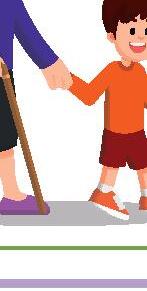




























• All About Feelings



















& R
Explain: an
You have to talk about an event or an experience that made you feel happy, from the options given in your book. Use the help words and the sentence structures that are given there to complete your presentation.
Instruct: Invite presentation.


Think for 2–3 minutes and then make your presentation. as many learners as possible for their presentations. Follow the E&R cycle for each

You can start by telling the learners about an experience when you felt happy. You may also use
Model Responses: 1.
Hi friends! Today, I will tell you about an experience when I felt out of the world. I still remember, it was my birthday party. I was with my family. It happened in my home. I cut my favourite strawberry cake. I felt very happy because while I was cutting my cake, my grandparents surprised me by getting a new puppy for me. He was so small and cute. It was the happiest day of my life. Thanks, everyone!
2 Hi was 3. her. Thanks everyone!



.Hi friends! Today, I will tell you about an experience when my joy knew no bounds. I still remember, it was 25 December. I was with my family. It happened in my house. I was sleeping in my room at night. Suddenly, I saw someone standing in my room! I felt very happy because it was Santa Claus. He was wearing red clothes, had a long white beard and had a bag full of gifts. Then, he gave me a gift and some chocolates. While I was playing with him, I realised it was my father who was dressed up as Santa Claus. Thanks, everyone!
Hi friends! Today, I will tell you about an experience when I was happy. I still remember, it was a Monday morning. I was with my friends. It happened in the street. I saw that an elderly woman had dropped some things that she was carrying. I quickly ran to her and collected all the things and put them in her bag. I felt very happy because that was the first time I had helped a stranger. The elderly woman was very happy and even bought me an ice cream. I felt really happy after helping
Homework



1. E-Speak 2: You have to record in the app how you feel when you have to present something in front of the class. Some clues are given in the app for your support. Practise in front of the camera and make several attempts before submitting your final response. The best model response will be read out to the class. You have to choose any one of the events given on page no. 31 and write your feelings related to the event. Ask for help at home to do the work. correctly. Practise saying the sentences aloud, again and again, in front of your
2. Plan and Speak: family.
• All About Feelings









How do you feel when you are asked to present your thoughts to the class? Talk about it in 3-4 lines.














Fill in the blanks with the correct expressions.

















































Introduce Expressions.
Say:
the Gaming Zone activity to the learners—
Show the example
Look at the boy’s expressions. What do you think he is feeling in each picture? given in the book.

Instruct: (The boy is feeling sad.)


Now, fill in the remaining blanks below the expressions with the correct feeling words. You may ask these suggested questions.
How is the boy in the second picture feeling?


2.
What is the expression on the boy’s face in the third picture? (The boy is looking shocked. / The boy’s expression is shocked.)
3. 4. think he is feeling?
How is the boy feeling in the last picture?
(The boy is feeling angry in the last picture.)
Look at the picture of the boy with the question mark near his head. How do you
(I think the boy is feeling confused.)
5. confused
Have you ever felt confused?

(Yes, I felt confused while deciding on a dress for my friend’s birthday party. / Yes, I felt confused while deciding what to eat for dinner.)



Say:

You did a digital project called ‘My Presentation Day’, where you shared how you feel when you are asked to present your thoughts in front of the class. Listen to my response to the project.
‘I feel very nervous when I am asked to present my thoughts to the class. I get worried about what my friends and teachers will think if I am not able to present my thoughts properly. I feel that my friends might make fun of me if I say something wrong in the class.’
Now, you will listen to another response and repeat after me.

‘I feel very excited when I am asked to present my thoughts to the class. I feel very happy because in this way my friends and teachers will get to know my thoughts on a particular topic. Even if I forget something or fumble, they will support me in my presentation.’



Instruct: Listen Say: another •

Chapter 4


You can also read a few of the best responses, submitted on the app by the learners, to the class and ask the learners to repeat those responses.



Share your experience with the class. Practise telling your experience to your family members.






Look at your friends and teacher when you speak.


















Plan and Speak



The Final Show

Choose an event and talk about your feelings related to the event, with the class.
Choose the event you want to talk about.





















Complete the sentences.
I am going to share my feelings on I felt (topic)




Finally, when the results were out, I felt










• All About Feelings





Say: the class.
Invite many presentation.
Now, you will talk about an event and your feelings related to that event, in front of as many learners as possible for their presentations. Follow the E&R cycle for each



Model Responses:


1. Hello, I am Rajiv.
I am going to share my feelings on Stage Performance. It was an inter-class poetry recitation competition. I felt very excited when I heard about it. I felt very nervous while preparing for it. I asked my mother for help to prepare for it. I felt shy when I was doing it. Finally, when the results were out, I felt happy. Thank you.
2. Hello, I am Brinda.
I am going to share my feelings on Tests. It was my first class test. I felt very scared when I heard about it. I felt confident while preparing for it. I asked my sister for help to prepare for it. I felt nervous when I was doing it. Finally, when the results were out, I felt overjoyed. Thank you.

3. Hello, I am Miranda. when the results were out, I felt excited. Thank you.


I am going to share my feelings on Competition. It was a racing competition. I felt very happy when I heard about it. I felt very enthusiastic while preparing for it. I asked my brother for help to prepare for it. I felt nervous when I was doing it. Finally,

Conclusion



Say: In this chapter, we learnt how to use feeling words to share our feelings about someone or something. We also learnt to share the details of an event.





Step-by-step instructions
Learning Objectives: Learners will be able to:
• follow instructions involving multiple steps.
• give clear instructions in order to get something done.


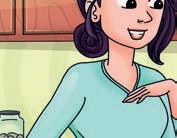

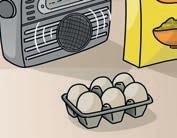

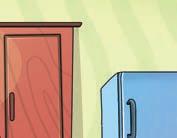




Step-by-step instructions
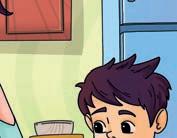
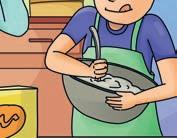
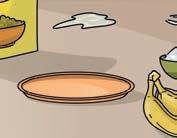




Cover Page Discussion
Say: Welcome to



Welcometo the Speak class. Today, we will read Chapter 5—How to Do?
Instruct: picture picture.
Look at the cover picture for one minute. Observe the things that you see in the
You may ask these suggested questions.

What is the boy in the picture doing?




(The boy in the picture is beating the cake batter by mixing different items in the bowl. / The boy is mixing something in a bowl.)
2.
What do you think the boy and his mother are trying to make? (It seems that they are trying to bake a cake.)

3. things all around.)
How does the kitchen look?
(The kitchen looks untidy because the boy and the mother are using a lot of things like eggs, bananas, flour and sugar. / The kitchen looks untidy because there are

the model description of the cover page.



On the cover page, we can see a kitchen. A boy and his mother are having a fun day of baking. They have all the necessary items like eggs, bananas, flour, sugar and salt. They even have a radio for entertainment. The boy is working hard, trying his best to mix the cake batter.

Go to page no. 34 of your content book. We will read the story—Golu Learns to Play
Look at the page for one minute.
You may ask these suggested questions.

What do you see in the first picture?
(In the first picture, I see a carrom board.)
2.
What are the things that are kept on the carrom board?



(There are round, black and brown pieces and one striker on the carrom board.)
3. Do you like playing carrom? Why / Why not?


(Yes, I love to play carrom because it is a very easy game. / No, I don’t like to play carrom. I only like to play outdoor games.)
We are going to read a story called Golu Learns to Play Carrom. learns the rules and techniques to play carrom. Now, let us begin reading. Pay attention to the steps and instructions that have to be followed.
• How to Do?



In this story, Golu







“There are nine white pieces, nine black pieces, and one pink piece. We need to first arrange them on the board like this,” instructed Ravi. Golu helped to place the pieces on the board. “So now I just strike as many pieces as I can, right?” Ravi responded patiently . “No, Golu. You need to choose either black or white pieces. You can only score with your pieces. Use the striker to strike your pieces. They have to fall into one of the four nets.”
“How much do I score if I put one of my pieces in the net?” asked Golu.
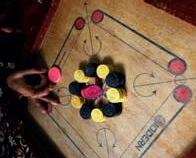



strike that one, you get 50
“Twenty points,” said Ravi. points.”
“And now that I’ve explained the rules, I get to strike first!” said Ravi.
“Wow! That was a good strike. My turn to play now –and STRIKE!” shouted Golu.

“Hahaha! Try shouting less and focus on winning the queen!” •






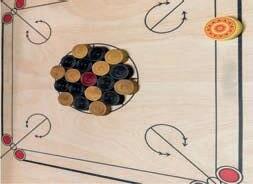






While cleaning his room, Golu found an old carrom board behind the cupboard. He went to his brother’s room in , “I found our old carrom board! Let’s play!” His brother Ravi laughed, “Where did you find this? Did you find the pieces too?” Golu started setting up the carrom board. “Yes, I found everything! I will beat you easily!” Ravi smiled at Golu’s confidence. “Okay, let’s play! Let’s see who beats whom.” Golu picked up the pink piece and started of the pieces.
excitement aiming at the rest


“That’s not the striker; that’s the queen!” laughed Ravi.
“Is that so? It looked different. I thought it was the striker,” said Golu. 12/13/2023 5:00:52 PM







the story aloud OR play the Talking Book
in the classroom.


aym.ing. You may stress on the syllable in bold, like ‘aym’.
You may pause at the annotations and ask these suggested questions.
After

After

Do you like playing board games? If you do, name some of them. (Yes, I like playing board games like ludo, snakes and ladders and chess. / No, I do

If you could play carrom, whom would you want to play it with?
(I would like to play carrom with my parents and sister. / I would like to play carrom

not like playing board games.) with my friends.)
After
How many pieces are there in a carrom board in total?
(There are pieces—9 black, 9 white, 1 pink and 1 white striker.)
After

What is the pink piece called?
(The pink piece is called the queen.)



After reading the text aloud, ask the learners about their experiences of playing indoor games like carrom, ludo, chess and other board games.
After the Text
You may ask these suggested questions.


2.
Who are Golu and Ravi? What are they doing?
List any two rules for playing carrom.
(Two rules for playing carrom are:

(Golu and Ravi are brothers. Ravi is teaching Golu the rules for playing carrom.)

a.Use the white striker to strike the pieces.
a. Use
b.The piece should fall into one of the four nets for points.)
b. The

How many points does the pink piece carry?
(The pink piece carries fifty points.)







“Let me tell you how to play?” asked Ravi. Golu agreed.
“There are nine white pieces, nine black pieces, and one pink piece. them on the board like this,” instructed
arrange Ravi.
Golu helped to place the pieces on the board. “So now I just strike as many pieces as I can, right?”
Ravi responded patiently

. “No, Golu. You need to choose either black or white pieces. You can only score with your pieces. Use the striker to strike your pieces. They have to fall into one of the four nets.”



“How much do I score if I put one of my pieces in the net?” asked Golu.
“What about the pink one?” asked Golu.
“That’s the queen. If you strike that one, you get 50 points.”
“And now that I’ve explained the rules, I get to strike first!” said Ravi.
“Wow! That was a good strike. My turn to play now – and STRIKE!” shouted Golu.
“Hahaha! Try shouting less and focus on winning the queen!”









Do?
















with them.
Read aloud
Instruct: aym.ing).
Instruct: to hit.
Instruct:

Now, we will understand the meaning of some words and learn to make sentences the first keyword, its meaning and the example sentence. Repeat the word after me—aiming ( Repeat the meaning after me—pointing a shot towards something that you want
Repeat the sentence after me—The police were aiming at the thief. Repeat this process for the other keywords as well.


Pronunciation Meaning arrange uh.

proper order
PronunciationMeaning Sentence put things in a neat or We should arrange the books on the shelf. .muhnta feeling of great joyPriya was filled with excitement upon hearing .tuhdto tell someone how to The principal instructed the teachers on how to arrange the stage for the competition.
excitement ik.syt.muhnt a joy Priya
instructed uhn.struhk.tuhd to do something patiently pay.shuhnt.lee in manner The
You may break the sentences into meaningful chunks for the learners to repeat them without difficulty. For example: We should / arrange the books / on the shelf.


patientlypay.shuhnt.leein a very calm mannerThe teacher listened patiently to the

Say: Now, I will call you, one by one, so that you can present your sentences for the keywords. Instruct: Make some sentences with the word ‘aiming’ and tell them to me. Repeat this process with all the keywords.
Model Responses:
1. Shooting includes 2.Arrange
Shooting aiming and firing.
2. Arrange the chairs properly in a circle. excitement
3. The was building as the game approached its end.
instructed
4. The judge the people to follow orders in his courtroom.
The bank customers waited patiently
5. The bank customers waitedpatiently in line.
Conclusion


This story is about two
Say: Today, we read the story called Golu Learns to Play Carrom. brothers named Golu and Ravi. We learnt the step-by-step instructions for playing carrom. We also learnt the importance of giving clear instructions. We learnt the words ‘aiming’, ‘arrange’, ‘excitement’, ‘instructed’ and ‘patiently’; and how to use them in sentences.
Homework
Say: Practise the E-Speak 1 projects given on page no. 36. Learn to give instructions by listening to and repeating the projects given in the app.














Binita is instructing her friend how to draw a cat. Listen and record it.




Binita gives instructions to complete the face of the cat. Listen and record it.


Binita gives the final instructions to draw the cat’s body. Listen and


















Text Recall



The name of the chapter is—
Say: How to Do?
Golu Learns to Play Carrom.
In the last class, we read a story called In this story, we read how Ravi gave the step-by-step instructions to Golu for playing carrom. We learnt how to give clear instructions. This helps the other person understand better. We also learnt the keywords ‘aiming’, ‘arrange’, ‘excitement’, ‘instructed’ and ‘patiently’; and how to use them in sentences.

Say:


Through this story and the projects, we are learning to give step-by-step instructions for doing something. We are also learning to follow instructions that involve multiple steps. The instructions should be given clearly and concisely.
Example from Text: gave
When Ravi gives instructions to his brother, Golu, about playing carrom, he explains how to arrange the board, the roles of different pieces and the striker, how to score and which piece guarantees how many points. He gave all the instructions clearly so that Golu could follow them and play carrom well.
Example from E-Speak 1: of
As a part of your homework project, you heard Binita instruct her friend how to draw a cat. She told her how to draw the cat’s face and body.


Say:
Now, I shall speak how Binita instructed her friend to draw a cat.
Instruct:

Repeat the project 5A after me—First, draw an oval shape for the face. Add two triangles on the top of the oval to make ears.
Instruct:
Repeat the project 5B after me—Draw two small circles in the face for the eyes. Then, add a small, upside-down triangle for the nose. Make a curved line for the mouth. Lastly, add three hair on the right and left of the face for whiskers.
Instruct: curved side legs. Finally, draw ‘S’ for the tail.




First, draw an oval shape / for the face. / Add two triangles / on the top /

Repeat the project 5C after me—For the body, draw two curved lines, one on the left side and one on the right side below the head. Make two long and two small ‘U’ for the Echo













Imagine that your classmates have made a card for Father’s Day. You have to give them instructions to decorate the card.

Hello friends!

to decorate the card.
to make the border.
to decorate the centre of the card.



Next, you can also put some to make it look more attractive.
to write Happy Father’s Day.























































E & R
Explain: of the prompts and help box.
Instruct: Invite presentation.
Now, imagine that your classmates have made a card for Father’s Day. You have to give them instructions on how to decorate that card beautifully. You can take the help
Think for 2–3 minutes and then make your presentation. as many learners as possible for their presentations. Follow the E&R cycle for each



You may encourage the learners to give clear, step-by-step instructions that are easy for their classmates to understand and follow.
Model Responses:
1. Hello friends!
You need sketch pens, colourful tapes, mirrors and paper flowers to decorate the card. First, use colourful tapes to make the border. Then, use a paper flower to decorate the centre of the card. Next, you can also put some mirrors to make it look more attractive. Finally, use sketch pens to write Happy Father’s Day.
Thank you.
2. Hello friends!

You need glitter pens, ribbons, pom pom balls and paper stars to decorate the card. First, use ribbons to make the border. Then, use a paper star to decorate the centre of the card. Next, you can also put some pom pom balls to make it look more attractive. Finally, use glitter pens to write Happy Father’s Day.
Thank you.



3. Hello friends!
You need sketch pens, colourful tapes, paint and pom pom balls to decorate the card. First, use colourful tapes to make the border. Then, use paint to paint a flower and decorate the centre of the card. Next, you can also put some pom pom balls to make it look more attractive. Finally, use sketch pens to write Happy Father’s Day.
Thank you.



Conclusion Homework

1. E-Speak 2:
2. Plan and Speak: on a picnic next Sunday. You have to
You have to record in the app how you pack your school bag daily in 3–4 steps. Practise in front of the camera and make several attempts before submitting your final response. The best model response will be read out to the class. Imagine that you are going on a picnic next Sunday. You have to tell the class how you will pack your bag in simple steps. Practise saying the lines aloud, again and again, in front of your family members.








We all pack our bags for school according to the time table. Tell us, in 3-4 steps, how you pack your school bag.









Look at the picture. Follow the instructions.







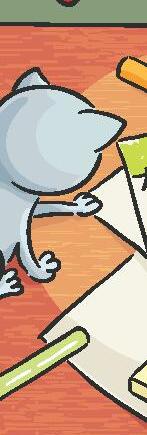




















Introduce
Say:
Instruct:



the Gaming Zone activity to the learners—Follow the Instructions.
Look at the picture carefully. Read the instructions given below. You have to read and follow the instructions. You may ask these suggested questions.

What is the girl doing?
(The girl is drawing.)


2. What is the kitten doing?
3.
What things are on the table?

(The kitten is sitting on the table and looking at the girl’s drawing.)
(There are colours, paints, paintbrushes, a glass of water, a lamp, a pencil and sheets of paper on the table.)
4. glass of milk to the table.)


What would you like to add to the table?
(I would like to add a flower vase to the table. / I don’t think we need to add anything to the table. It already has too many things on it. / I would like to add a




Say: You did a digital project called ‘Pack Your Bags’, where you told us about how you pack your school bag in 3–4 steps.
Instruct: stationery items that I need.’
Listen to my response to the project.
‘Hello friends! I look at my daily timetable before starting to pack my bag. I pack my school bag according to it, so that I do not miss anything. I arrange my books and notebooks properly. Then, I put my pencil box which has all my pens, pencils, erasers and other
Say:
Now, you will listen to another response and repeat after me.
‘I pack my school bag daily according to the timetable. I arrange books and notebooks. that I need. I put my pens, pencils, etc. properly in a pencil box. I also put the completed worksheets and assignment sheets in the folders.’




I pack / my school bag / daily according to / the timetable. / I arrange / the books


You can also read a few of the best responses, submitted on the app by the learners, to the class and ask the learners to repeat those responses.



Tell your class the steps for packing the picnic bag. Practise telling the steps to your family members.


























the picnic. Tell the class about the steps for packing your bag.



Complete the sentences given below.









I am going to First, I will select a bag. I will pack my things in a I will make a list of all the things that I will need at the picnic. Then, I will start by putting a After that, I will put a •
















Say:
Now, you will present to the class the different steps for packing your bag for a picnic next Sunday. Talk about how you will pack your bag and what things you will put in it. as many learners as possible for their presentations. Follow the E&R cycle for each
Invite many presentation.
You may encourage the learners to stand straight and maintain eye contact with the audience while presenting.
Model Responses:



1. Hello friends!
I am going to the
Lotus Valley Park for a picnic. First, I will select a bag. I will pack my things in a big bag. I will make a list of all the things that I will need at the picnic. Then, I will start by putting a water bottle in the bag. After that, I will put in a mat to sit and relax on. I will also put in a bat and ball to play with my brother. Finally, I will put in some food like fruit and chocolates to eat at the picnic. We will have a wonderful day at the picnic.
2. Hello friends!




Finally, I will put in some snacks like and muffins to eat at the picnic. We
I am going to the lakeside for a picnic. First, I will select a bag. I will pack my things in a red bag. I will make a list of all the things that I will need at the picnic. Then, I will start by putting a pair of sunglasses and a hat in the bag. After that, I will put in a sheet to sit and relax on. I will also put in a flying disc to play with my brother. samosas will have a wonderful day at the picnic.
3. Hello friends! day at the picnic.
I am going to the farm for a picnic. First, I will select a bag. I will pack my things in a blue bag. I will make a list of all the things that I will need at the picnic. Then, I will start by putting a cap and sunscreen cream in the bag. I will add a small bag to bring back some fresh vegetables from the farm. After that, I will put in a mat to sit and relax on. I will also put in a football to play with my brother. Finally, I will put in some snacks like cakes and biscuits to eat at the picnic. We will have a wonderful





Say: In this chapter, we learnt to give step-by-step instructions. We can now give clear instructions to someone and explain things easily. We also learnt to follow instructions which have multiple steps.





Participate in informal conversations
Learning Objectives: Learners will be able to:
• engage in simple conversations on day-to-day topics.
• answer simple questions during informal conversations.



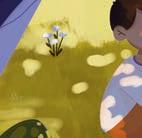
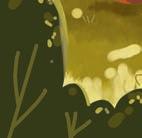







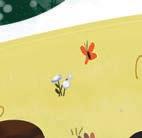
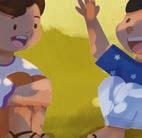




Participate in informal conversations

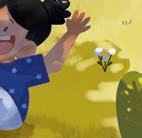






You may ask these suggested questions.
Cover Page Discussion Say: . Instruct: picture. ?
Welcome to the Speak class. Today, we will read Chapter 6—Small Talks Look at the cover picture for one minute. Observe the things that you see in the

What do you see in the picture
(I see a girl and a boy sitting under a tree and talking.)


How do the two children look?
(The children look happy and excited.)
What time of the day do you think it is? Why?


(I think it is morning. / I think it is afternoon. I can see the sunlight and the
Have you ever sat under a tree and talked with anyone?

(Yes, I have sat under a tree and talked to my friends / parents when we went to the park. / No, I have never sat under a tree and spoken to people.)
the model description of the cover page.

Listen Text Comprehension


On the cover page, we can see a bright sunny day. A girl and a boy are sitting in a park, and they are talking under a tree. They seem to be talking about something happy and funny. There are flowers and butterflies around them.

15 mins

What are the boy and the girl doing in the first picture?
(The boy and the girl are talking to each other.)
Look at the thought bubble. What do you think the girl is talking about? (I think the girl is talking about watering the plants.)
What do you think is happening in the second picture? (It seems that the boy is helping his father to set the table, in the second
Before the Text Say: . Instruct: 2. 3. picture.)
Go to page no. 42 of your content book. We will read the story–I Will Help You Look at the page for one minute. You may ask these suggested questions.


4. story.

Read the title of the story. What do you think the story may be about? (I think the story may be about helping one another.) , where Suraj and Dhwani talk Help Others Week.
We are going to read a story called I Will Help You
Now, let us begin reading. Instruct: simple questions during the conversation.




Pay attention to how Suraj and Dhwani engage in a conversation and answer

You may explain to the learners that the word ‘conversation’ means when two or more people are engaged in talking to each other about a topic.
• Small Talks










That is a thoughtful idea. Maybe I could also help my dad set the dinner

Dhwani: How do you intend to help others? I am planning to help my younger brother tidy up his room. Besides, he doesn’t know how to tie his shoelaces,
Dhwani: That is very impressive!
Dhwani: I should go now. I promised to today. Suraj: All right, I’ll see you tomorrow. Bye!
Dhwani: Goodbye! Have a great time helping others.
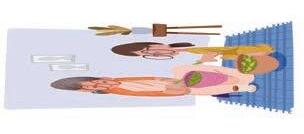






•




I Will Help You
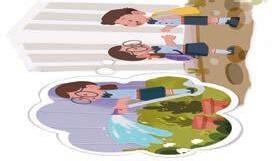

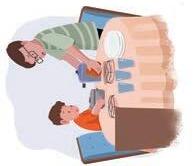

adventure . They are determined to remember Help Others Week starts Of course! I have not I will help my mother by I will also help my mother


Suraj and Dhwani are very good friends. Standing outside their school gate, they are all set to plan their Help Others Week spread smiles. Suraj: Hey, I hope you that the next Monday.
Dhwani: forgotten it. Suraj: Whom do you plan to help?
Dhwani: watering the plants in the morning before going to school. Suraj: That is fantastic! My brother and I also water the plants daily. What else do you have in mind?
Dhwani: set the dinner table.







the
the story aloud OR play Talking Book in the classroom.
You may read the story aloud with voice modulation and expressions or ask a confident or eager learner to read the lines of the other character with you.
You may pause at the annotations and ask these suggested questions.

Why are Suraj and Dhwani talking about helping others?




How will Dhwani help her mother?
(Suraj and Dhwani are talking about helping others because the Help Others starts next Monday.)

(Dhwani will help her mother by watering the plants and by helping her set the dinner table. / Dhwani will help her mother by setting the dinner table with her.)
How will Suraj help his younger brother?

What did Dhwani promise her grandmother?


(Suraj will help his younger brother by helping him tidy his room and teaching him how to tie his shoelaces.)
(Dhwani promised her grandmother that she would help her shell the peas.)
You may ask these suggested questions.

Who were having a conversation in the story?


If any learner gives the correct answer, you may ask the other learners in the class to repeat after him/her. This will boost the confidence of the learner.
(Dhwani and Suraj were having a conversation in the story.)

others.)


How would you like to help your friends in the class?



Do you think it is a good thing to help others? How do you feel after helping others? (Yes, I think it is a good thing to help others. I feel happy / proud / joyful after

(I would like to help my friends with their studies. / I would like to help my friends by sharing my lunch with them.)


For open-ended questions based on the learners’ real-life experiences, you may rephrase their answers into complete sentences. For example: I would like to help my friends with their studies.




That is a thoughtful idea. Maybe I could also help my dad set the dinner
Dhwani: others?
How do you intend to help
Suraj: tidy up
Dhwani:


I am planning to help my younger his room. Besides, he doesn’t know how to tie his shoelaces, so I can help him learn to do it. That is very impressive! promised help my grandmother shell the peas
Dhwani: I should go now. I to today.
Suraj:
Dhwani: helping others.




All right, I’ll see you tomorrow. Bye! Goodbye! Have a great time





• Small Talks table.


U24ENCB_Grade4.indb
ven.chuh): an exciting and unexpected experience determined (dih.tuh.mihnd): to make up one’s mind to do something promised (pro.misd): made sure to do something for someone (ruh.mem.buh): to think of something that happened in the past (tai.dee uhp): put things back in their proper places so that everything is neat


















Say: with them.
Read aloud


Instruct: ven.chuh).
Instruct:
Instruct:
Repeat

Now, we will understand the meaning of some words and learn to make sentences the first keyword, its meaning and the example sentence. Repeat the word after me—adventure (uhd. Repeat the meaning after me—an exciting and unexpected experience. Repeat the sentence after me—Meera’s trip to the mountains was an adventure. this process for the other keywords as well.




PronunciationMeaning
Pronunciation Meaning .mihnd to
promised pro.misd made sure to do something for someone
dih.tuh.mihndto make up one’s mind to do Sheetal was determined to complete her project before the weekend.
I promised my mother to help her buy vegetables.
remember ruh.mem.buh to think of something that happened in the past birthdays. tai.dee uhp put things back in their proper places so that everything is neat weekend.


I always remember my friends’ tidy up tai Mili likes to tidy up her room every


You may break the sentences into meaningful chunks for the learners to repeat them without difficulty. For example: I promised / my mother / to help her / buy vegetables.
this process with all the keywords.
Say: Now, I will call you, one by one, so that you can present your sentences for the keywords. Instruct: Make some sentences with the word ‘adventure’ and tell them to me. Repeat Model Responses:
1. adventure
2. to win the quiz competition.
3. my sister to help her with her homework.
4. reading this book in class 3.
Soham waited for the summer break to begin. Priya was determined I promised I remember
5. tidy up
The teacher asked the students to the classroom.
Conclusion

Today, we read the story called

Homework

Say: I Will Help You. In this story, we read the conversation between Suraj and Dhwani, where they discussed helping their family members during the Help Others Week. We also answered simple questions on how we help at home. We learnt the words ‘adventure’, ‘determined’, ‘promised’, ‘remember’ and the phrase ‘tidy up’; and how to use them in sentences.

Say: Practise the E-Speak 1 projects on page no. 44. Learn to start a conversation and how to respond to questions by listening to and repeating the projects given in the app.













Rachit asks Saloni about her recent visit to the Toy Bazaar. Listen and record it.





Saloni responds to Rachit’s question and enquires about his experience. Listen and
Saloni asks Rachit what he did at the Toy Bazaar. Listen to his reply and


























Text Recall



Say: Small Talks.
I Will Help You.
The name of the chapter is— In the last class, we read a story called In this story, we read the conversation between Dhwani and Suraj where they were talking about helping their family members during the Help Others Week. how to engage in simple conversations, and answer questions during a conversation. We learnt the keywords ‘adventure’, ‘determined’, ‘promised’, ‘remember’ and the phrase ‘tidy up’; and how to use them in sentences.
Say:
We learnt to



Through this story and the projects, we are learning to engage in simple conversations on day-to-day topics, and answer simple questions in informal conversations. When we engage in a conversation, we should listen to the people we are conversing with, attentively. We should be polite and respectful to each other.
Example from Text: Help Others Week his shoelaces.


In the story, Dhwani and Suraj are talking about how they are going to help their family members during the . Suraj asks Dhwani, “Whom do you plan to help?” She answers that she will help her mother by watering the plants and setting the dinner table with her. When Dhwani asks Suraj how he intends to help others, he answers that he will help his younger brother tidy up his room, and teach him how to tie
Example from E-Speak 1: As a part of your homework project, you heard Rachit and Saloni talk about their visit to the Toy Bazaar. Rachit and Saloni shared their experience at the Toy
Bazaar.
Say:
Now, I shall say what Rachit and Saloni shared with each other.

Repeat the Project 6A after me—Hey, Saloni! Did you go to the Toy Bazaar last weekend? How was your experience?
Repeat the Project 6B after me—Hi Rachit! Yes, I went to the Toy Bazaar. It was so much fun. I got a new block game. What did you do at the Toy Bazaar?
Repeat the Project 6C after me—I played on the swings with my brother and enjoyed myself a lot. I got new skates from the Toy Bazaar. Can we play your new block


Instruct: Instruct: Instruct: play game together?


Hey, Saloni! / Did you / go to / the Toy Bazaar / last weekend? / How was











Imagine that your partner is your cousin. You both are going to a children’s park together. Present your









conversation in the class. I cannot wait! I plan to … .








I am … How do you feel about our visit to the children’s park today?






























Look at your partner when you speak.



















Explain:
Now, you have to get into a pair with your partner. Imagine your partner is your cousin, with whom you have to go to the children’s park. You need to present a conversation that you will have with your cousin.
Instruct: Invite presentation.


Think for 2–3 minutes and then make your presentation. as many pairs as possible for their presentations. Follow the E&R cycle for each

You may encourage the learners to decide their roles and read their lines clearly and loudly. Motivate them to use expressions and proper voice modulation.
Model Responses:

1. Student 1: Hello, Maya!
Student 2: Hi Raghav! How are you?
Student 1: I am fine. How do you feel about our visit to the children’s park today?
Student 2: I am eager to visit this park.
Student 1: I cannot wait! I plan to go down the slide and play on the seesaw.
Student 2: Yes! And then we can play in the sand.
Student 1: This sounds so much fun.
Student 2: Let us hurry up.
2. Student 1: Hello, Kiaan! today?
Student 2: Hi Aarna! How are you?



Student 1: I am on cloud nine. How do you feel about our visit to the children’s park
Student 2: I am excited to visit this park.
Student 1: I cannot wait! I plan to go on the merry-go-round and a bumper car ride.
Student 2: Yes! And then we can watch the ducks swim and eat tasty food.
Student 1: This sounds so much fun.
Student 2: Let us hurry up.



Homework
1. E-Speak 2: where

You have to record in the app what you will tell Rashi when she asks you about a place from where she can buy a school bag, in 3–4 lines. Practise in front of the camera and make several attempts before submitting your final response. The best model response will be read out to the class.
2. Plan and Speak: your family members.
Think about the conversation you will have with Trisha about a special plan. Complete the dialogue on page nos. 47 and 48. Ask for help at home to do the work correctly. Practise reading the lines aloud, again and again, with






ask her.



Your friend, Rashi asks, “I want to buy a new school bag for my birthday. Do you know a place from where I can buy it?” Respond to Rashi’s question in 3-4 lines.





do you like the most?
How did you spend your last Sunday?














You have made a new friend, Tina. Colour any five questions that you want to



What makes you happy?
sing? Do wake up early in the morning?

Can you sing?Do you like to Where did you go on your last vacation?
Who is your best friend?

Which is your favourite dress? most?

Which animal do you like as a pet? most?
Which subject do you like the

Which cartoon do you like the favourite game?
Which is your most?


Which colour do you like the
Which is your favourite song? What do you like the most about your best friend? sad?



What do you do when you are






Introduce
Say:
Instruct:


My New Friend.
the Gaming Zone activity to the learners— There are some questions given in the boxes. Read the questions carefully and colour / circle any five questions that you would want to ask your new friend, Tina. You may ask these suggested questions.


You may ask the questions given in the gaming zone activity from the learners in the class to find out more about them.

2. (Mishika is my best friend. / Param is my best friend.)

Chhota Bheem.
3. / I like to watch 4. (I like to play cricket. / I like to play badminton.)



Tom and Jerry.)

You may ask a few learners to share five questions of their own that they would like to ask their new friend.
Say: You did a digital project called ‘Where Do I Go?’, where you responded to Rashi’s question about a shop where she can buy a new school bag.
Instruct: Listen to my response to the project.
Say: Now, you will listen to another response and repeat after me.


‘Hi Rashi! You can go to the City Centre Market. There is a shop on the first floor which sells bags. The name of the shop is ‘Comfy Bags’. You will find different types of bags there.’
‘Hi Rashi! You can go to the Old Bazaar to buy your school bag. There is a shop named ‘Cool Bags’ and they have a very good collection of school bags. I recently bought my school bag from that shop.’




You can also read a few of the best responses, submitted on the app by the learners, to the class and ask the learners to repeat those responses.



Even I like that a lot. You should try it at Thank you. I will surely eat there next time.




















Listen carefully to the questions and respond politely. You can give your own answers. Now, say the dialogues with the teacher in the class. Practise the dialogues with your family member. parents’







friend, Trisha, about a special plan. Complete the dialogue. Then, present it in the class. Complete the conversation. You may take help from the clues on the next page.






















Yes, of course! What type of food does your family like to eat?


Oh, then you should try the new restaurant beside the new mall. Thank you so much! What type of food do you like?


(continued...)









Say:
Imagine I am your friend, Trisha. You have to engage in a conversation with me about a special plan for a family dinner. as many learners as possible for their presentations. Follow the E&R cycle for each
Invite many presentation.
You may ask the learners to share the conversation with proper voice modulation and actions.



You may read out some model answers between the learners’ presentations to give them some understanding about how to frame their responses in a complete sentence using adequate vocabulary.
Model Responses:
Student 1: Hi Trisha! I need your help.
Trisha: Hi Mia! Please tell me, how can I help?
Student 1: It’s my birthday. We are planning to go out for dinner.
Trisha: That’s great! How can I help you?
Student 1: Can you suggest a place where I can go out for dinner with my family?
of
Student 1: We like to eat Chinese food.
Trisha: Yes, of course! What type of food does your family like to eat?
Trisha: Oh, then you should try the new restaurant beside the new mall.
Student 1: Thank you so much! What type of food do you like?
Trisha: I like to eat Indian food.



Student 1: Even I like that a lot. You should try it at Magnum Restaurant.
Trisha: Thank you. I will surely eat there next time.
Student 2: Hi Trisha! I need your help.
Trisha: Hi Neha. Please tell me, how can I help?
Student 2: It’s my sister’s birthday. We are planning to go out for dinner.
Trisha: That’s great! How can I help you?
Student 2: Can you suggest a place where I can go out for dinner with my family?
of
Student 2: We like to eat South Indian food.

Trisha: Yes, of course! What type of food does your family like to eat?
Trisha: Oh, then you should try the new restaurant beside the new mall.
Student 2: Thank you so much! What type of food do you like?
Trisha: I like to eat Mexican food.
Student 2: Even I like that a lot. You should try it at Pearl Restaurant.
Trisha: Thank you. I will surely eat there next time.




Conclusion


Say: In this chapter, we learnt to engage in simple day-to-day conversations and answer simple questions during informal conversations.



Making predictions
Learning Objectives: Learners will be able to:
• talk about future plans and events.
• make predictions about future events.




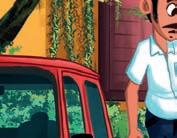
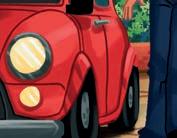


Making predictions

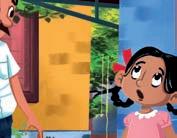
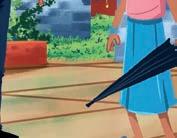






Cover Page Discussion
Say:



Welcome to the Speak class. Today, we will read Chapter 7—What Happens Next?
Instruct: picture picture.
Look at the cover picture for one minute. Observe the things that you see in the
You may ask these suggested questions.

Who do you see in the picture?



(I see a man and a girl. They are standing outside. There is a red car beside them. The girl is holding an umbrella.)

Look at the sky in the picture. Is it clear or cloudy? What do you think might happen
(It is cloudy. It might rain soon.)

Look at the expressions of the girl and the man. What do they tell you?
(Their expressions tell me that they are worried that it might rain.)
the model description of the cover page.



On the cover page, we see a girl and a man. The girl is holding an umbrella. They are standing outside, beside a red car. They seem to be worried that it will rain heavily.

Go to page no. 50 of your content book. We will read the story—The Fox With a Plan.
Look at the page for one minute.
You may ask these suggested questions.

2. soon? grandchildren.)
Who do you see in the picture?
(I can see two children with their grandmother. / I see an old woman with her
2.
What do you think is happening in the picture?
(I think the grandmother may be telling her grandchildren a story.)
3.
Have you heard any stories from your grandmother or any other older family member? Do you like listening to their stories? Why or why not?



(Yes, I have heard stories from my grandmother. I like listening to the stories shared by her because those stories are full of fun and adventure.)
The Fox With a Plan.



We are going to read a story called In this story, Akhil and Akshay’s grandmother tells them a story about a cunning fox and how it tries to eat a herd of lost sheep. Now, let us begin reading.
Pay attention to how the children make predictions about what will happen next in the story that their grandmother is telling them.









grateful for the family’s kindness. The sheep helped the family by providing them with wool.
“One day, a cunning fox came near the on the farm. Akshay. “Yes! The fox knew that the family was very kind. He pretended to be injured and knocked on the door. “I need help, I need help,” he cried. “The kind family took him in. That night, the sly fox crept into the barn and attacked the sheep. Little did he know that the family had many guard dogs in the barn as well.

“So, who can tell me what happened next?” Grandmother asked Akshay and Akhil.

Akshay and Akhil wonder how the story will end. What do you think?


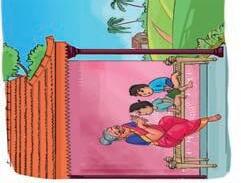
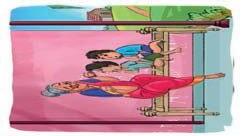







Akshay and Akhil love listening to their grandmother’s stories. Like every other evening, Grandmother has another interesting story today. “Many years ago, there was a family that lived in a village. They were very kind. They

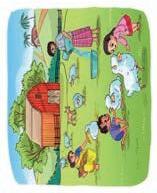
their shepherd. They were running
A kind family gave them some water to drink and a place to sleep. The children were delighted to play with the sheep and pet them. What do Grandmother.
“Did the sheep live with the family after that?” asked Akhil.


“Yes, they waited for the owner to come and claim the sheep, but no one came. The family decided to






in the classroom.



After
You may pause at the annotations and ask these suggested questions.
What do you think will happen to the herd of sheep?
After

What would you do if you found a lost animal?


(I think the herd of sheep may be harmed by some wild animals, like wolves and tigers. / The herd of sheep will be safe. / The herd will be found by the shepherd.)
(If I found a lost animal, I would take care of it by giving it some food and clean water. / If I found a lost animal, I would look for its owner.)
After
What could the fox have thought after seeing the
After

(The fox could have thought about eating them.)
What could have happened at the end of the story?

the story aloud OR play the Talking Book a its seeing sheep? could have killed the fox.)




(I think the guard dogs could have chased the fox away. / I think the guard dogs



After the Text
You may ask these suggested questions.

(The story ended with the grandmother asking Akshay and Akhil to guess what
How did the story end? would happen to the fox.) we have to guess its ending.) it came true?



2. How is this story different from other stories that you have read? (Other stories give us the ending directly, but this story ends with a question where
3. Could you tell the class about a situation where you had to make a prediction and
(Once, I strongly felt that my sister would buy me a doll for my birthday. I told my friend about it. Then, on my birthday, my sister actually gave me a doll.)
Chapter 7
• What Happens Next?






family’s kindness. The sheep helped the family by providing them with wool.
“One day, a cunning fox came near the village. He saw the healthy sheep grazing
“Did the fox want to eat the sheep?” asked


“Yes! The fox knew that the family was to be injured and knocked on the door. “I need help, I need
for the on the farm. very kind. He pretended help,” he cried. the sly fox crept

“The kind family took him in. That night, into the barn and attacked the sheep. Little did he know that the family had many guard dogs in the barn as well.

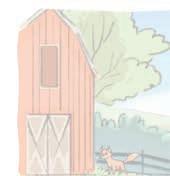






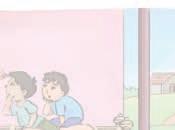








“So, who can tell me what happened next?” Grandmother asked Akshay and Akhil. Akshay and Akhil wonder how the story will end. What do you think?











Say: with them.
Now, we will understand the meaning of some words and learn to make sentences
Read aloud
Instruct:
the first keyword, its meaning and the example sentence. Repeat the word after me—claim (klaym).
Instruct:
Instruct:
Repeat

Repeat the meaning after me—to say that something belongs to you. Repeat the sentence after me—I claim that the red lunchbox belongs to me. this process for the other keywords as well.


PronunciationMeaning

krept moved softly, without making The thief crept into the house in the middle of the night.
grateful grayt
Pronunciation Meaning any noise grayt.ful feeling thankful


The poor man was grateful for the clothes he received from the kind family. Shweta pretended to like the food at the
ten.duhd to make people believe something that is not true party. clever and trying to trick others
Whenever Raunak played tricks on his brother, he wore a sly smile on his lips.


You may break the sentences into meaningful chunks for the learners to repeat them without difficulty. For example: I claim that / the red / lunchbox / belongs to me.
E & R me.
Repeat
this process with all the keywords.
Model Responses:
Meera will claim
Say: Now, I will call you, one by one, so that you can present your sentences for the keywords. Instruct: Make some sentences with the word ‘claim’ and tell them to me.
1. her pencil box from the lost-and-found room in the school.
The little mouse crept the Mona was very grateful
2. into the kitchen to find some food.
3. for the gifts she received.
Meeta pretended
4. to be happy after her friend left.
The sly
Conclusion

5. fox quietly walked into the forest to find some food.

Homework
The Fox With a Plan. In the story, the
Say: Today, we read an incomplete story called grandmother tells her grandchildren a story. But she does not complete it and keeps her grandchildren guessing. We learnt to guess what could happen next in a story, based on the details that we had. We also learnt the words ‘claim’, ’crept’, ‘grateful’, ‘pretended’ and ‘sly’; and how to to use them in sentences.
Chapter 7
• What Happens Next?



Say: Practise the E-Speak 1 projects on page no. 52. Learn to talk about your future plans by listening to and repeating the projects given in the app.
 E & R
E & R







record it.






Vibha is going to her grandmother’s house next week. She tells her friend how she will reach there. Listen and
Vibha tells her friend what she will eat at her grandmother’s house. Listen and record it.













Vibha talks about the things she will do at her grandmother’s house. Listen and





















Text Recall



Say: What Happens Next?
The name of the chapter is—
incomplete story called ‘pretended’



In the last class, we read an The Fox With a Plan. In the story, the grandmother tells a story to her grandchildren. The story she narrates is about a herd of sheep who lost their shepherd and a family who helped and took care of the sheep. The grandmother stops in between her narration and asks her grandchildren what they think will happen next. The story ends with the grandmother asking the children and the readers to make predictions about the ending. We learnt to make predictions. We also learnt the keywords ‘claim’,’ crept’, ‘grateful’, ‘pretended’ and ‘sly’; and how to use them in sentences.
Say:
Theme-based
Through this story and the projects, we are learning to predict and speak about plans or events that might take place in the future. When we are thinking about a future event or plan, we are making predictions.
Example from Text:


In the story, the grandmother pauses between her story, and asks her grandchildren to predict what could happen next. In her story, when the family helped the sheep by giving them water to drink and a place to sleep, the grandmother asks, “What do you think happened next?”. Based on the details that the children have, they try to guess the answers. In the end, the grandmother does not complete the story after the fox goes inside the barn to attack the sheep, instead she asks the children to guess what they think might happen next.

Example from E-Speak 1: of do there.
E-Speak 1
Say:
As a part of your homework project, you heard Vibha sharing information about her future trip to her grandmother’s house. She told her friends how she would get there, what she would eat there, and about the different things that she would
Now, I shall speak about Vibha’s plans for her future trip to her grandmother’s house.
Instruct: the village.
Instruct: the
Repeat the Project 7A after me—My grandmother lives in a village near Shimla. First, I will board a train, from Delhi to Shimla, with my family. Then, I will take a taxi to reach

Instruct:

Repeat the Project 7B after me—I am excited to eat the local food of Shimla. I will eat madra, Shimla’s traditional dish. It is made up of boiled chickpeas, which are mixed with creamy gravy.

Repeat the Project 7C after me—The village is surrounded by many mountains. I will go on a trek with my parents in the hills. I will also play in the snow.

My grandmother / lives / in a village / near Shimla. / First, I will / board a
• What Happens Next?










Imagine that you are going somewhere during the summer vacation with your family. Plan your trip and present it to the class.


(name of the place)
We will go by … to reach there.
We will take … clothes with us.
We will do … there.
We will eat …



























Speak clearly and loudly.


• What Happens Next?





















Explain:
Imagine that you are going somewhere with your family during the summer vacation. You have to plan your trip and present your plan to the class. Think for 2–3 minutes and then make your presentation. as many learners as possible for their presentations. Follow the E&R cycle for each
Instruct: Invite presentation.



You may encourage the learners to stand straight and maintain eye contact with the audience while presenting. Ask them to start and end their presentations with greetings.
Model Responses: 1. eat Kashmiri pulao and Thank you. 2. Indian food. Thank you. 3.
Hello everyone! We will go to Kashmir for ten days. We will go there by aeroplane. We will take warm clothes with us. We will do trekking and sightseeing there. We will curries.
Good morning, friends! We will go to Kerala for five days. We will take a bus to reach there. We will take cotton clothes with us. We will do boating there. We will eat South
Hi friends! We will go to Udaipur for four days. We will go there by car. We will take colourful cotton clothes with us. We will do sightseeing there. We will eat Rajasthani food. Thank you so much.




Homework
1. E-Speak 2: lines. Practise
2. Plan and Speak: family member.



You have to listen to the story of a lion and a fox in the app. Then, record your prediction of what will happen next in the story in 3–4 lines. Practise in front of the camera and make several attempts before submitting your final response. The best model response will be read out to the class. You have to choose any one of the beginnings of the stories given on page no. 55. Read the story carefully and make predictions about the ending of the story. Ask for help at home to complete the work. Practise saying the ending of the story aloud, again and again, in front of your friends or an older
• What Happens Next?












Listen to the story about a lion and a fox. Then, say in 3-4 lines what you think will happen next in the story.












) the picture that should come next in the series of pictures.






























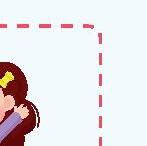















Introduce What Next?
Say:
the Gaming Zone activity to the learners—
Look at picture sets 1 and 2. Each picture set has a missing ending. Tick the picture that should come next in the series of pictures for each set. You may ask these suggested questions.

Instruct: the dishes.)
What is shown in the first set? What is the missing end?



(In the first set, a boy reads about making cupcakes. Then, the boy bakes cupcakes. After baking them, he eats them. The missing end is the boy washing

2.
What is shown in the second set? What is the missing end?
3. you, ending differently.)
4.
(In the second set, a girl wakes up. She has her breakfast. She goes to school. The missing end is the girl studying in class.)
If the answer pictures were not given to you, would you have guessed the ending? (Yes, I would have guessed the ending correctly. / No, I would have guessed the

What would you have guessed as the last activity for each set?

Say:
(I would have guessed that the boy studies after eating the cupcakes. / I would have guessed that the girl talks to her friends after going to school.)




You did the digital project called ‘What Will Happen Next?’, where you heard the story about a lion and a fox and said what would happen next, in 3–4 lines.
Listen to my response to the project.
Instruct: were
‘One day, he went inside the lion’s den and saw that many other animals were trapped there, and the lion was sleeping. He quietly opened the lock and helped the animals escape. The fox tricked the lion and locked him in his den. After that day, the lion did not disturb any other animal again and everyone thanked the fox.’
Now, you will listen to another response and repeat after me.
Say: themselves one


‘One day, he went inside the lion’s den and saw that there was a secret tunnel. He went through the tunnel and saw the lion and the other animals planting more trees on the other side of the tunnel. The fox was confused and asked them what they were doing. The lion then explained his plan that they all were making a secret forest to save themselves from the hunters, who were hunting the animals one by one. The fox was happy to hear that and he also helped them make the new forest to live in.’

One day, / he went inside / the lion’s den / and / saw that there was / a secret tunnel.

You can also read a few of the best responses, submitted on the app by the learners, to the class and ask the learners to repeat those responses.
Chapter 7
• What Happens Next?




Present your version of the ending of the story in the class. Practise telling the ending of your story to your family members.


























Plan and Speak



The Final Show

It’s your turn to guess the ending of a story. The beginning of two stories is given below. Pick any ONE and guess the ending. Present the ending of your story in the class.


Once, there were two goats. They were crossing a narrow bridge but from the opposite sides. When they reached the middle, neither of them would agree to



The Stolen Ring



One day, King Akbar lost his ring. He was sure one of his courtiers had stolen it. He asked Birbal to find the thief. Clever Birbal thought and said that he knew who the thief was and he had a straw in his beard.


Write: Complete the sentences to write the ending.



The story I chose is I think It can also happen that Thank you.



• What Happens Next?
&

Say: ending of the story. Invite many presentation.




The beginnings of two stories are given on page no. 55. You have to present the as many learners as possible for their presentations. Follow the E&R cycle for each E&R
You may encourage the learners to narrate the complete story with proper expressions and voice modulation. You can also ask them to use different props while narrating the story.
Model Responses:
1.
The Two Goats.
2.

I think at the end, they will come up with an idea. One of the goats will sit down and the other goat will jump over the goat who is sitting and then both of them will cross
It can also happen that both the goats will start fighting, and no one will want to move. In the end, they both will fall off the bridge and get hurt.
Hello, everyone!


I think after Birbal said that the thief had a straw in his beard, a man quickly went to shave his beard. The next day, when Birbal saw the man without a beard, he followed him and found the lost ring at his home. Akbar was happy and gave a
It can also happen that when Birbal said that the thief had a straw in his beard, one of the men started scratching his beard in Akbar’s court, and the ring fell from his hand. Then, everyone caught the thief and Akbar thanked Birbal.
The Stolen Ring. plans


Chapter 7
• What Happens Next?


Say: In this chapter, we learnt to talk about future plans and make predictions about future events.





Making announcements
Learning Objectives: Learners will be able to:
• identify key details from an announcement.
• make a short announcement.




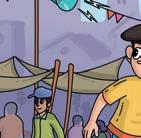




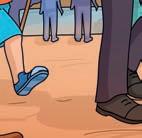





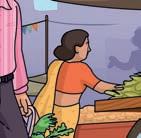




Cover Page Discussion
Say:
Instruct: picture picture.


Welcome to the Speak class. Today, we will read Chapter 8—Hello, Attention Please! Look at the cover picture for one minute. Observe the things that you see in the
You may ask these suggested questions.

Where do you think the father and the son are?


(I think the father and the son are in a market.)


2. What are they doing?
3. announcing?
(They are walking. The father is carrying a bag of vegetables. The son is looking back at something / someone.)
Look at the chapter title. Now, guess what the loudspeaker in the picture may be

(The loudspeaker may be announcing ‘Hello, Attention please!’ / ‘Attention Here’.)
the model description of the cover page.



On the cover page, we see a boy and his father in the market. It is a busy market. Something important is being announced through the loudspeaker and the boy is looking back at it. The announcement catches the boy’s attention.

Go to page no. 58 of your content book. We will read the story—An Unforgettable
Look at the page for one minute. You may ask these suggested questions.

Who do you see in the first picture?
(I see a father, mother and daughter.)
2. What are they doing?
(They are putting their luggage in the trunk of their car.)
3.
Where is the family in the second picture?
(In the second picture, the family is at the train station / on a railway platform.)
4. An Unforgettable Morning
Have you ever been on a train? Do you like train journeys? Why? / Why not?





(Yes, I have been on a train. I like train journeys because I love the sights I get to see from the window. / No, I do not like train journeys because I cannot sleep properly. / No, I have not been on a train.)

We are going to read a story— . It is about Anusha and her family who are on their way to Jaipur. She hears different announcements about their train at the station. Now, let us begin reading.
Pay attention to the key details in the announcements that are made at the
• Hello, Attention Please!





from Delhi to Jaipur is going to arrive at platform 6 in five minutes.


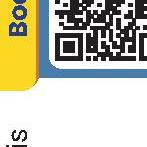
Passengers are requested to board the train.”
“Oh no! Are we going to miss our train?” Anusha hurries as she holds onto her mom’s hand. The way to the platform is filled with people. It is
“We must hurry and get there as fast as we can!” says mom. Attention, please. 04706 Jaipur Super Special has been delayed by one hour.” train is delayed! Papa, that announcement is for us, right?” “No, Anusha. That’s a different train. Our train number is 14646. Now, let’s hurry up!”

The three of them rush towards the platform, but they have only reached platform 3
Just then, Anusha hears another announcement, “ says Dad. by now. Anusha still hopes they make it on time. That’s when she hears the best announcement ever! changed. The train will now arrive at platform 3.”
“Attention, please. The platform for train no. 14646 Shalimar Express from Delhi to Jaipur has been “Yes!” Anusha cries in excitement. “We are already on platform 3!” She is so happy that they made it on time. Phew! What a morning it has been!













• Hello, Attention Please!

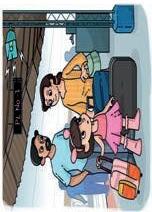


are already packed. She is so excited to go to Jaipur that she is the first one to get Mom. They are finally ready to leave. They arrive at the New Delhi Railway Station, but it is so crowded ! How will they ever catch the train on time? Anusha wonders which platform their train announcement . from Delhi to Jaipur is going to arrive at platform 6.” 6,” Dad says. Platform 6 is at the other end of the station. They have to hurry! All platform. That’s when they hear another announcement.








the story aloud OR play Talking Book in the classroom.
the
While reading out the story, you may modulate your voice for the announcements, so that it interests
You may pause at the annotations and ask these suggested questions.



What is Anusha worried about? Why?


(Anusha is worried if they will be able to catch the train or not. She wonders this because they are late and the railway station is very crowded.)
After think the be
Anusha and her family are already late and in a hurry. What do you think the second announcement can be about?
(I think the second announcement can be about the train having reached the platform. / I think the second announcement can be about the train running late.)
Why does Anusha feel that it is not possible to reach platform 6 in five minutes?
After 4



Will Anusha and her family miss their train or not?

(Anusha feels that they can’t reach platform 6 in five minutes because it is on the other side of the station. They are already late and the way to the platform is filled
You may ask these suggested questions.

After minutes? is with people.) family 3 platform just in time.) platform 6.)
(I think Anusha and her family will miss their train as they are on platform 3 and the train will arrive at platform 6. / I think they will not miss the train and reach the

If a learner shares answers that are correct in grammar and meaning, then you may ask the rest of the class to repeat those answers after the learner. This will enhance that learner’s confidence.
What did Anusha get to know from the first announcement?
(From the first announcement, Anusha got to know that the train will arrive at





2.
What did Anusha get to know from the last announcement?
3. announcement.)
(From the last announcement, Anusha got to know that the platform of their train has been changed. It would now arrive at platform 3.)
Have you ever heard an announcement? Where? What was it about?

(Yes, I have heard an announcement at school. The announcement was made by the principal to let us know about Sports Day. / I have heard an announcement at the fair. It was about the lost-and-found articles. / No, I have never heard an





from Delhi to Jaipur is going to arrive at platform 6 in five minutes. are requested to

“Oh no! Are we going to miss our train?” Anusha hurries as she holds onto her mom’s hand. The way to the platform is filled with people. It is impossible to reach platform 6 in five minutes!
“We must hurry and get there as fast as we can!” says mom.
Just then, Anusha hears another announcement, “Attention, please. 04706 Jaipur Super Special has been delayed by one hour.”
train is delayed! Papa, that announcement is for us, right?”


Passengers board the train.” says Dad.





“No, Anusha. That’s a different train. Our train number is 14646. Now, let’s hurry up!”
The three of them rush towards the platform, but they have only reached platform 3 by now. Anusha still hopes they make it on time.
That’s when she hears the best announcement ever! “Attention, please. The platform for train no. 14646 Shalimar Express from Delhi to Jaipur has been changed. The train will now arrive at platform 3.”

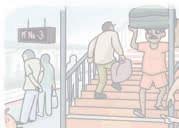


“Yes!” Anusha cries in excitement. “We are already on platform 3!” She is so happy that they made it on time. Phew! What a morning it has been!








.smuhnt): information given over a loudspeaker at a public place (bawd): to get on the train, plane, ship or bus (krau.duhd): filled with too many people or things (pa.suhn.juhz): people travelling in a vehicle, other than the driver platform (plat.fawm): the raised area next to railway tracks, where people wait for a train
• Hello, Attention Please!












Say: with them.


Now, we will understand the meaning of some words and learn to make sentences
Read aloud
the first keyword, its meaning and the example sentence. Repeat the word after me—announcement (uh.
Instruct:
Instruct: footwear store.
Instruct: nown.smuhnt).
Repeat the meaning after me—information given over a loudspeaker at a public place. Repeat the sentence after me—I heard the announcement related to a sale at a
Repeat this process for the other keywords as well.




PronunciationMeaning
Pronunciation Meaning
crowded krau.duhd filled passengers pa.suhn.juhz
platform plat.fawm the
You may break the sentences into meaningful chunks for the learners to repeat them without difficulty. For example: The bus was / so crowded / that I / had to stand.


to get on the train, plane, ship or Ram will board the flight in the crowdedkrau.duhdfilled with too many people or The bus was so crowded that I had passengerspa people travelling in a vehicle, other The taxi driver asked the passengers to wear their seatbelts. platformplat.fawmthe raised area next to railway tracks, where people wait for a train I am waiting on the platform for my

You may use visual aids to better explain the words ‘crowded’, ‘passengers’ and ‘platform’ to the learners.
Model Responses:
E & R principal today. board crowded at the airport. got out. platform.
1. The principal is expected to make an announcement
Say: Now, I will call you, one by one, so that you can present your sentences for the keywords. Instruct: Make some sentences with the word ‘announcement’ and tell them to me. Repeat this process with all the keywords.
2. Riya and her family are waiting to the train.
3. It’s so
4. The driver stopped the car and the passengers
5. There are many stalls for food and books on the Conclusion


An Unforgettable Morning
Homework
Say: Practise the E-Speak 1 projects on page no. 60. Learn to make announcements by listening to and repeating the projects given in the app.
Chapter 8 • Hello, Attention Please!



Say: Today, we read a story called . It was about Anusha and her family who are able to catch their train to Jaipur, just in time. We learnt to listen to announcements attentively and identify the key details. We also learnt the words ‘announcement’, ‘board’, ‘crowded’, ‘passengers’ and ‘platform’; and how to use them in sentences.










eating. Listen and record it.



Ranjeet visited a Dussehra fair in his neighbourhood. He heard an announcement about a new ride. Listen





When Ranjeet was riding on the giant wheel, he heard another announcement about a lost wallet. Listen and record it.
Ranjeet heard an announcement about keeping the area clean, when he was
























Text Recall
The name of the chapter is


Say: Hello, Attention Please! called mentioned in them.
In the last class, we read a story An Unforgettable Morning. We read a story about Anusha’s family. They were going to Jaipur. We learnt how to listen to announcements and to pay attention to the details
We also learnt the keywords ‘announcements’, ‘board’, ‘passengers’, ‘crowded’ and ‘platform’; and how to use them in sentences.



Say:
Through this story and the projects, we are learning to make short announcements. We are also learning to identify key details from an announcement after listening to them carefully. When we make announcements, we should give all the important details. We should make an announcement concisely and in a formal tone.
Example from Text:
When Anusha was going on a trip to Jaipur with her family, they had to board a train. She heard a lot of announcements at the railway station, which gave her important updates about the arrival of her train and its platform. The announcements she heard mentioned the train number, the train name and other important updates. For example: “14646 Shalimar Express from Delhi to Jaipur is going to arrive at platform 6 in five minutes. Passengers are requested to board the train.” Whenever there was an update regarding the train’s status, an announcement was made.


Example from E-Speak 1: E-Speak 1

As a part of your homework project, you heard Ranjeet talk about the announcements that he heard when he went to the fair. These announcements were regarding a new ride, a lost wallet and keeping the area clean.
Say:
Now, I shall speak the announcements that Ranjeet heard at the fair.
Instruct: prices at the ticket counter.
Instruct:
Repeat the Project 8A after me—We have an exciting news to share! This time, we have a giant wheel at the fair. It is a fun and thrilling ride. You will get to know about the
Repeat the Project 8B after me—Attention please! We found a brown wallet at the games counter. If the wallet belongs to you, please come at the counter and take it.
Instruct:
Repeat the Project 8C after me—Attention all! We request you all not to litter on the ground. Please use green dustbins for wet waste and blue dustbins for dry waste.




We have / an exciting news / to share! / This time, / we have / a giant wheel














Imagine that you are in a market with your family. The market is very crowded. Think of an announcement that you might hear in the market. Make an announcement in














Pick how you will begin your announcement.















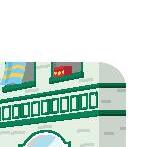



We are thrilled to announce ...






















Explain:
Imagine that you are in a crowded market with your family. Think of an announcement that you might hear in the market and present it to the class. You can use the prompts given. First, choose the topic of your announcement. Then, pick how you want
to begin your announcement.
Instruct: Invite presentation.


Think for 2–3 minutes and then make your presentation. as many learners as possible for their presentations. Follow the E&R cycle for each


1. Attention please!
This announcement is for a mobile phone that has been reported as lost within the market. It is a white iPhone14 with a red back cover. If found, please bring it to the market’s information desk immediately.
We request everyone to be watchful and check their belongings.
2. Attention, shoppers!

This announcement is for some fun and games at the market. We are thrilled to announce our latest ‘Games Mania’. You can shop at any store to receive a game card. Scratch your card to receive exciting prizes. You can win exclusive discounts and other grand prizes.
Let the game begin!



3. Attention! Attention!
This announcement is for all the sweet lovers.
Gather at the shop ‘Delight in Heaven,’ right here in Shakuntala Market. We offer a range of traditional sweets along with chocolates and freshly baked pastries. There is a special discount for all our customers in this opening week.
We can’t wait to welcome you all.

Homework


1. You have to record in the app an announcement for a cleanliness drive in your school in 3–4 lines. Listen to the audio stimulus given in the app. Practise in front of the camera and make several attempts before submitting your final response. The best model response will be read out
2. You have to choose an event out of the two options given—a fancy dress competition or a dance competition and make an announcement about it. Write your announcement on page no. 63 of the book. Practise saying your announcement in a suitable tone
Chapter 8 • Hello, Attention Please!

E-Speak 2: model to the class. Plan and Speak: your in front of your family members.









Cleaning our school is a great way to keep it tidy and hygienic. Your school has organised a cleanliness drive. Make an announcement about it in 3-4 lines.











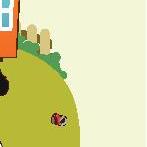


children’s hands.”

















Circle the places where you can hear this announcement. “Attention please! Since it is very crowded, we request everyone to hold your



























Say:
the Gaming Zone activity to the learners—The Announcement
Introduce .
Listen to the announcement—“Attention please! Since it is very crowded, we request everyone to hold your children’s hands.” Have you heard this announcement anywhere?

Instruct: railway stations.)

Now, circle all the places where you can hear such an announcement. You may ask these suggested questions.


Name any two places where you hear such an announcement.
(The two places where I hear such an announcement are shopping malls and

2. of silence?
3. Say:
In which of the following places, is there always an announcement to maintain
(In a library, there is always an announcement to maintain silence.)
What kind of announcement is commonly heard in public places like a park, a shopping mall, etc.? Give an example.




(The commonly heard announcement in public places is—Keep the area neat and clean. Make sure you throw the garbage in the dustbins.)


You did a digital project called ‘Listen! Listen!’, where you made an announcement about a cleanliness drive that is being organised at your school in 3–4 lines.
Listen to my response to the project.
Instruct: school
in making a positive impact!’
Say:
Now, you will listen to another response and repeat after me.
‘Listen, everybody! We are excited to announce a special cleanliness drive week at the school, starting Monday, 22 January 2024. The drive is to ensure that all the surroundings are neat and clean. Let’s work as a team and make our school environment clean. Join us
‘Attention, everyone! Our school is organising a cleanliness drive, and we need your help. We have to promote a clean and healthy school environment. There is also a postermaking competition on Monday, 24 March 2024. This drive will inspire everyone to keep the school clean. For more details, contact Neena ma’am.’



Attention, everyone! / Our school / is organising / a cleanliness drive, / and we / need your

You can also read a few of the best responses, submitted on the app by the learners, to the class and ask the learners to repeat those responses.




In the class, make the announcement in front of your friends. Now, practise the announcement in front of your family.























Plan and Speak
The Final Show

You have to make an announcement about an event. Prepare and present it in ) the event you want to make the announcement for.





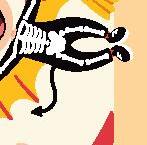
You can use a pencil/pen/pencil box as the mike. the class. Our school is organising a This is for grades You need to bring For any other details, please talk to Thank you! (who can participate) (a teacher’s name) (list of things needed for the event)


Write: Complete the announcement.










Say: about or a dance competition. Invite many presentation.
Now, you will make an announcement in the class about a fancy dress competition as many learners as possible for their presentations. Follow the E&R cycle for each


1.
Attention, please!
Our school is organising a fancy dress competition on Monday, 15 January.
This is for grades 3 to 5. that you require for the get-up.
2.

You need to bring your fancy dress costume, jewellery, props and any other things
For any other details, please talk to Rakhee ma’am.
Thank you!
Attention, please!
Our school is organising a dance competition on Friday, 20 January.
This is for grades 4 and 5.
You need to bring your dance costume, accessories, props, and the song that you

require for your performance in a pen drive. For any other details, please talk to Rekha ma’am.

Thank you!




Say: In this chapter, we learnt to listen to announcements carefully and pay attention to the important details in them. We also learnt how to make short announcements.




Conversations in daily life situations
Learning Objectives: Learners will be able to:
• ask questions politely during a conversation.
• share responses and feelings during a conversation.



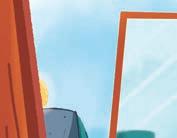
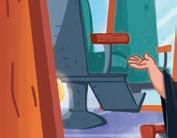



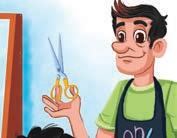
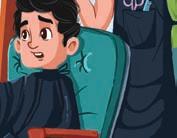








Cover Page Discussion
Say:
Instruct: picture picture.


Welcome to the Speak class. Today, we will read Chapter 9—Daily Conversations. Look at the cover picture for one minute. Observe the things that you see in the
You may ask these suggested questions.


What is the man holding in his hand? (The man is holding a pair of scissors.)

Can you guess the place by looking at the picture? (Yes, it’s a barber’s shop.)


List a few things that you can see in the shop. (I can see a hair dryer, a comb, a roll of tissue paper, another pair of scissors and a big mirror on the other side.)
What do you think the boy is saying?

(I think the boy is telling the barber what type of haircut he wants. / I think the boy is asking the barber about new hairstyles.)
the model description of the cover page.




On the cover page, we see a boy at the barber’s shop. He is sitting in the chair. It seems that he is politely asking the barber if he can get the kind of a haircut that he wants. The barber has covered his clothes with a big sheet of black cloth. He is listening to the boy. He is holding a pair of scissors in his hand.
Go to page no. 66 of your content book. We will read the story—Monu Goes Shopping
Look at the page for one minute. You may ask these suggested questions.




• Daily Conversations

It is about a boy
We are going to read a story called Monu Goes Shopping Alone. named Monu. His mother asks him to go to Kumar Uncle’s shop to buy a few things. Now,
Pay attention to how Monu, his mother and Kumar Uncle ask questions and politely respond to them during a conversation.























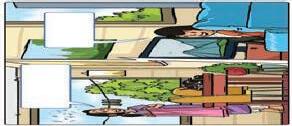












in the classroom.



You may pause at the annotations and ask these suggested questions.

After


(Monu’s mother called him because she needed him to buy a packet of milk and a packet of sugar
After
After
You may read the dialogue between the characters with proper voice modulation and expressions. the story aloud OR play the Talking Book Why did Monu’s mother call him? from Kumar Uncle’s shop.) clothes. had gave half of it to Kumar Uncle.)



Why has Monu gone to Kumar Uncle’s shop alone? (Monu has gone to Kumar Uncle’s shop alone because his mother was busy drying the clothes. That is why, she could not go with him.)
After


How much money did Monu have with him? How did he pay Kumar Uncle? (Monu had one hundred rupees with him. He tore the hundred-rupee note and
What did Kumar Uncle tell all the children?



(Kumar Uncle told all the children that one should never tear or damage money.)


After the Text
You may ask these suggested questions.

Monu’s mother called him because she needed him to buy a packet of milk
Where did Monu’s mother ask him to go? (Monu’s mother asked him to go to Kumar Uncle’s shop.)

Uncle I will not tear or damage the money.)
2. Have you ever gone to a shop on your own to buy things? (Yes, I have. Sometimes when my parents send me to a nearby shop for a few things. / No, I have never gone to a shop on my own.)



3. If you have a 100 rupee note and you have to pay 20 rupees, how will you pay? (I will give the note to the shopkeeper. I will wait till he gives me 80 rupees change.





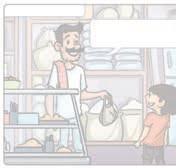
Half of this?

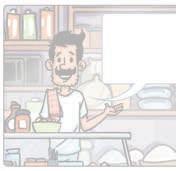

Uncle, what is the total? I have a hundred rupees with me.



Well, the total price is So, you only have to pay half of that.
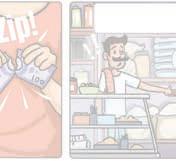
Children! You should never money. That is not 50! Now, explain
tear or damage how you pay let me go and this to Monu!



• Daily Conversations






Here you go, Uncle! Half of a hundred! Thank you for the milk and sugar.

Monu, wait!






U24ENCB_Grade4.indb 67 12/13/2023 5:03:31 PM


Say: with them.


Now, we will understand the meaning of some words and learn to make sentences
Read aloud
Instruct: da.muhj).
Instruct: it less useful.
Instruct:


the first keyword, its meaning and the example sentence. Repeat the word after me—damage ( Repeat the meaning after me—physical harm caused to something which makes Repeat the sentence after me—Earthquakes can damage buildings. Repeat this process for the other keywords as well.

PronunciationMeaning
Pronunciation Meaning explain ek.splayn to make something clear or easy to understand

Sentence
Teachers explain a topic to the students to help them understand it easily.
packet pa.kuht a something This right away rite uh.way now or immediately right away.

t.air to pull something apart into pieces notebooks.

packetpa.kuhta small bag of somethingThis packet of sweets is for 20 rupees. Please bring all notebooks to my desk
Please don’t tear pages from your


You may break the sentences into meaningful chunks for the learners to repeat them without difficulty.For example: Please don’t / tear pages / from your notebooks.
Repeat
this process with all the keywords.
Model Responses:
Today, we read a story called difficulty. For
Say: Now, I will call you, one by one, so that you can present your sentences for the keywords. Instruct: Make some sentences with the word ‘damage’ and tell them to me.
1. the walls so much.
2. the topic again?
3. packet.
4. ight away.
The leaking water did not damage Can you please explain the I don’t litter, I keep the waste in a Please put the food in the fridge r You need to tear
Conclusion

5. open the packet of chips.
Say:

Homework

Monu Goes Shopping Alone. Monu’s mother asks him to go to Kumar Uncle’s shop on his own. He has to buy a couple of things from the shop. In this chapter, we learnt how to ask questions politely when talking to someone. We also learnt to share our responses and feelings during a conversation. We learnt the words ‘damage’, ‘explain’, ‘packet’, ‘tear’ and the phrase ‘right away’; and how to use them in sentences.

Say: Practise the E-Speak 1 projects on page no. 68. Learn to ask questions and share your responses by listening to and repeating the projects given in the app.










Smita’s mother has asked her to buy something from the nearby shop. Listen and record it.






Smita agrees to go to the shop and asks her mother for something. Listen and record it.

Smita’s mother feels proud of her. Listen to her reply and record it.
































Text Recall
The name of the chapter is—


Say: Daily Conversations. called
In the last class, we read a text Monu Goes Shopping Alone. In this chapter, we learnt how to ask questions politely when talking to someone. We learnt to respond to the questions and share our feelings. We also learnt the keywords ‘damage’, ‘explain’, ‘packet’ and ‘tear’ and the phrase ‘right away’; and how to use them in sentences.

Say:


Through this story and the projects, we are learning how to ask questions politely during a conversation. We are also learning to share our feelings and reply politely when we are taking part in a conversation. When we engage in a conversation, we should listen to the other person attentively and be polite to them.
Example from Text: to
In the story, Monu’s mother politely asks him to help her. She says, “Monu, can you please go and buy a pack of milk and a pack of sugar from Kumar Uncle’s shop?” to which he replies, “That’s okay! I will be back in 5 minutes.” Monu himself asks the shopkeeper politely, “Can you please give me one packet of milk and one packet of sugar?” to which the shopkeeper replies, “Sure, Monu. I will get your things”.
Example from E-Speak 1: of E-Speak 1

As a part of your homework project, you heard the conversation between Smita and her mother. They asked each other questions politely. Smita’s mother also shared how she felt about Smita ’s decision.

Say: mother

Now, I shall speak the conversation that Smita and her mother had about shopping.
Instruct:
Repeat the Project 9A after me—Smita, can you go to the nearby shop and buy a packet of milk and a loaf of bread? I have to prepare breakfast.
Instruct:
Repeat the Project 9B after me—Of course, mother. Can you please give me a cloth bag? My teacher has asked us to not use plastic bags.
Instruct:
Repeat the Project 9C after me—I am so happy and proud of you. Here is the bag. Take this money, and don’t forget to ask for the bill.




I am / so happy / and proud / of you. / Here is / the bag. / Take this money,











Imagine you are at a shop to buy something and your teacher is the shopkeeper. Present the conversation in the class.



Yes, that is on top of the shelf on your right.














































Here it is. Please put the … in this cloth bag.

You have to pay … rupees.


Of course. It is so thoughtful of you to bring your own bag. I am proud of you.







• Daily Conversations






Explain:
Imagine you are at a shop to buy something and I am the shopkeeper. What will you say to me? How will you ask me if I have the items you want to buy or not? Think for 2–3 minutes and then make your presentation. as many learners as possible for their presentations. Follow the E&R cycle for each
Instruct: Invite presentation.


You may encourage the learners to use their own questions and sentences. If time permits and learners seem confident, you may even make pairs of your learners and have them enact this conversation.
Model Responses:
Student 1: Hello! Do you have a pack of biscuits?


Teacher (Shopkeeper): Yes, that is on top of the shelf on your right.
Student 1: I am hungry. Can I also get a packet of chips?
Teacher (Shopkeeper): Sorry, I think that is finished.
Student 1: No problem, how much do I have to pay?
Teacher (Shopkeeper): You have to pay 40 rupees.
Student 1: Here it is. Please put the biscuits in this cloth bag.
Of course. It is so thoughtful of you to bring your own bag.
Student 1: Thank you so much.
Student 2: Hello! Do you have a bottle of shampoo?
Teacher (Shopkeeper): Of course. It is so thoughtful of you to bring your own bag. I am proud of you.
Teacher (Shopkeeper): Yes, that is on top of the shelf on your right.


Student 2: I am famished. Can I also get a box of cookies?
Teacher (Shopkeeper): Sorry, I think that is finished.
Student 2: No problem, what is the total amount?
Teacher (Shopkeeper): You have to pay 140 rupees.
Student 2: Here it is. Please put the shampoo in this cloth bag.

Teacher (Shopkeeper): Of course. It is so thoughtful of you to bring your own bag.
Of course. It is so thoughtful of you to bring your own bag. I am proud of you.
Student 2: Thank you so much.

Conclusion
Homework



You have to record in the app what you will say to your cousin whom you have met after a long time, in 3–4 lines. Listen to the audio stimulus to talk to your cousin. Practise in front of the camera and make several attempts before submitting your final response. The best model response will be read out to the class. I will set you into pairs. You have to imagine that you and your partner are cousins. Your cousin sister has come to stay with you after a long time. Both of you are planning the things you will do together. Complete the conversation with your partner and practise, again and again. You may ask your other friends or older family members for help.









Meeting cousins can be a wonderful and enjoyable experience. Imagine that you meet your cousin after a long time. Speak in 3-4 lines, what you will say to him when you see him.







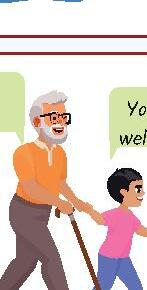










Match the pictures with the correct polite expressions. One has been done for you.





I am sorry!









Introduce Polite Expressions.
Say:
the Gaming Zone activity to the learners—
Show the example
Instruct:
Now, match the pictures with the correct polite expressions. You may ask these suggested questions.


On the left, there are some pictures showing a few situations. On the right, there are polite expressions that can be used in those situations. given in the book.


What will you say if you accidentally break something?
(If I accidentally break something, I will say, ‘I am sorry!’)
What would you say when you wish your friend on his/her birthday?
(When I wish my friend on his/her birthday, I would say, ‘Happy birthday!’)

Say:
What would you say if you had a question for your teacher?
(I would say, ‘Excuse me, ma’am!’)


What would you say if you were an old person and someone helped you cross the


You did a digital project called ‘My Cousin’, where you shared, in 3–4 lines, what you will tell your cousin when you see him after a long time.

Instruct: going at your school?’
Listen to my response to the project.
‘Hello, Nishant! We are meeting after so long. I missed you. How are you? How are things
Say:
Now, you will listen to another response and repeat after me.
‘Hello, Prateek! It is so nice to meet you. How are you? How were your final exams?’
You may break the sentences into meaningful chunks for the learners to repeat them easily. Hello, Prateek! / It is / so nice / to meet you. / How are you? / How were / your / final exams?


You can also read a few of the best responses, submitted on the app by the learners, to the class and ask the learners to repeat those responses.
















I am so


Practise the dialogues with your friend.
Now, present the conversation in the class together.
















I like that too. We should definitely watch a film while you are here. that you are here. I would love that. We can also (suggest what you could do together) conversation in the class.
Get into pairs. Imagine your cousin sister has come to stay at your house after many years. Both of you are planning the things you will do together. Present the Complete the conversation.


Great! Let us plan what we can do together. I play (name)



My journey was That’s an amazing idea. Do you play any sport? (name of the sport)


(continued...)




• Daily Conversations





Say: conversation
Now, you and your partner will present to the class the conversation that you have prepared, imagining that you are talking to your cousin sister. as many pairs as possible for their presentations. Follow the E&R cycle for each
Invite many presentation.

You may encourage the learners to speak clearly and politely, with expressions and actions. Guide them to maintain eye contact and speak in complete sentences.
If time permits, encourage the learners to exchange their roles and have the conversation again. This will encourage them to think creatively and practise speaking in a better way.
Model Responses: 1.

Student 1: Hi, Mirab! How are you?
Student 2: Hi, Hamid! I am good.
Student 1: How was your journey?
Student 2: My journey was smooth. I am very excited about my stay.
Student 1: Great! Let us plan what we can do together.
Student 2: That’s an amazing idea. Do you play any sport?
Student 1: I play badminton at my school. What do you like the most?
Student 2: Oh, I love to play chess.
Student 1: That is very interesting. Do you like to watch films?
Student 2: Yes, I like watching comedy films.


Student 1: I like that too. We should definitely watch a film while you are here.
Student 2: I would love that. We can also bake a cake together with the help of Aunt.
Student 1: Yes, we can! Wow! I am delighted that you are here. 2.
Student 1: Hi, Kashish! How are you?
Student 2: Hi, Dheeraj! I am good.
Student 2: My journey was comfortable. I am very excited about my stay.
Student 1: Great! Let us plan what we can do together.
Student 2: That’s an amazing idea. Do you play any sport?
Student 1: I play basketball at my school. What do you like the most?
Student 1: How was your journey? like
Student 2: Oh, I love to paint.
Student 1: That is very interesting. Do you like to watch films?
Student 2: Yes, I like watching action films.
Student 1: I like that too. We should definitely watch a film while you are here.
Student 2: I would love that. We can also paint with watercolours together.

Student 1: Yes, we can! Wow! I am so glad that you are here.

Conclusion


Say: In this chapter, we learnt to ask questions politely and share responses and feelings during a conversation.




Talking about imagination
Learning Objectives: Learners will be able to:
• enjoy imaginative poems and stories.
• share imaginations and creative thoughts in brief.


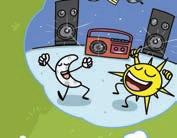
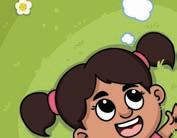








Talking about imagination







Cover Page Discussion
Say:



Welcome to the Speak class. Today, we will read Chapter 10—Let’s Imagine!

Instruct: picture picture. and 2. are dancing together.)
Look at the cover picture for one minute. Observe the things that you see in the
You may ask these suggested questions.
What are the two children doing?



(The two children are lying on the grass and happily imagining something.)


Look at the two thought bubbles. What do you think the children are imagining? (I think that the children are imagining about the Sun and the Moon singing and
Have you ever imagined something that otherwise cannot be done in real life?

(Yes, I have imagined that Earth and other planets are dancing around the Sun. / No, I have not imagined any such things.)
the model description of the cover page.




On the cover page, we can see a boy and a girl. They are lying on the grass. They are happily imagining the Sun and the Moon singing and dancing together.
3. the .
Go to page no. 74 of your content book. We will read the poem—Baani and Her Balloon Look at the page for one minute. You may ask these suggested questions.

What do you see in the first picture?
Read the title of the poem. What do you think the poem is about?
3.
(I see a girl holding a red balloon. She is in her room. There is a bed, a computer, a desk and a chair. Her two toy teddy bears are on the floor.)
(I think the poem is about a girl named Baani who likes to play with balloons.)




Do you like playing with balloons? When do you play with balloons? (Yes, I like to play with balloons. I play with them when I am at a birthday party. / No, I do not like to play with balloons. They make a loud noise when they burst.)
Explain: Baani and Her Balloon


We are going to read a poem called . This poem is about a little girl, Baani, and her new, red balloon. She loves to have fun, playing with her red balloon. When she sleeps, she imagines that she has gone to visit Mr Moon with her balloon. Now, let us begin reading.
Pay attention to Baani’s imagination, when she is playing with the balloon and











Are soaring off to meet Mr Moon.
Merrily across dreamland, they zoom. They soar high and high, Baani bounces the tiny clouds and tickles the twinkling stars, As they whizz across the sky!
Oh, what a Oh, what a sparkling sight! Nighty-night, sleep tight. It’s time to wish you goodnight.

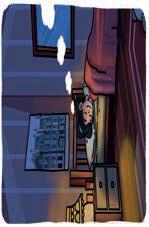



delight ! •












12/13/2023
5:03:58 PM
giggles As her new Balloon wriggles. Up and down it goes, It bounces off the wall, It tickles her teeny-weeny nose.
Naughty Balloon skips and dances.
Clapping and jumping, Along with it, Miss Baani prances snuggles Balloon in bed, She smiles as it winks at her, Oh, so bright and lovely in red!






in the classroom.



lite. You may stress on the syllable in bold, like ‘lite’.
You may pause at the annotations and ask these suggested questions.
the poem aloud OR play the Talking Book as her new balloon wriggles.)
After

How does the poet describe Baani’s nose? What do you think that means? (The poet describes Baani’s nose as teeny-weeny. I think it means that Baani has a small and cute nose.)
After

How does Baani feel as her new balloon wriggles? How do you know? (Baani feels happy as her new balloon wriggles. I know this because she is all smiles and giggles
After


Why do you think the poet says “a sparkling sight”?
(I think the poet says “a sparkling sight” to describe the starry night sky.)





What do Baani and her balloon do in her dream? (Baani and her balloon soar off to meet Mr Moon. They zoom across the dreamland merrily. They soar high, bounce on the tiny clouds, tickle the stars and whizz across the sky.)


You can rephrase the answers in complete sentences based on your learners’ responses. For example: poet describes Baani’s nose as teeny-weeny. I think it means that Baani has a cute and small nose.
The

After the Text
You may ask these suggested questions.

What is the poem about?
What does Baani dream about?

(The poem is about a girl named Baani and her red balloon that she loves very much.)



2. (Baani dreams about going to visit Mr Moon and zooming across the dreamland with her balloon.)
3. Baani loves her balloon and plays with it all day long. What/Whom do you love the most? Why? (I love to play with my doll because it was given to me by my grandmother. / I love to play with my pet dog, Royal. He is my best friend.)

• Let’s Imagine!






Are soaring off to meet Mr Moon. Merrily across dreamland, they zoom.
Baani bounces the tiny clouds and tickles
As they whizz across the sky!









• Let’s Imagine! They soar high and high, the twinkling stars, delight!


(duh.lite): something that gives joy giggles (gi.glz): laughs quietly prances (praan.suhz): walks with a lot of energy (snuh.glz): moves into a comfortable position (sor): something that rises high very quickly






Oh, what a Oh, what a sparkling sight! Nighty-night, sleep tight. It’s time to wish you goodnight.










U24ENCB_Grade4.indb 75 12/13/2023 5:04:02 PM




Say: with them.
Read aloud
Instruct: lite).
Instruct:
Instruct:
Repeat the meaning after me—something that gives joy.

Now, we will understand the meaning of some words and learn to make sentences the first keyword, its meaning and the example sentence. Repeat the word after me—delight (duh.
Repeat the sentence after me—It was a delight to have an ice cream with three flavours, at the fair.
Repeat this process for the other keywords as well.


PronunciationMeaning

Pronunciation Meaning giggles gi.glz quietly Meena prances praan.suhz walks with a lot of energy school. snuggles snuh.glz moves into a comfortable position sor something that rises high very quickly


Sentence gigglesgi laughs quietlyMeena giggles merrily every time she sees a clown. prancespraan My dog prances with joy when I come home from snugglessnuh
The cat snuggles into my lap and falls asleep. The many-coloured kites soar high in the sky.


You may break the sentences into meaningful chunks for the learners to repeat them without difficulty. For example: It was / a delight / to have / an ice cream / with three flavours, / at the fair.
E & R
this process with all the keywords.
Model Responses:
1. It is such a delight
Say: Now, I will call you, one by one, so that you can present your sentences for the keywords. Instruct: Make some sentences with the word ‘delight’ and tell them to me. Repeat
1 to drink hot chocolate during winters.
The baby giggles
2. when it sees its favourite toy.
Meera happily prances
3. around the garden.
The little girl snuggles
4. beside her mother.
5.
The birds soar up in the sky.
Conclusion


Today, we read a poem called meet
Homework
Chapter 10
• Let’s Imagine!

Say: Baani and Her Balloon. It was about Baani and her favourite toy—the new red balloon. She loved playing with it. When she slept, she dreamt that she and her balloon have soared off to meet Mr Moon. We learnt to enjoy an imaginative poem. We also learnt the words ‘delight’, ‘giggles’, ‘prances’, ‘snuggles’ and ‘soar’; and how to use them in sentences.
Say: Practise the E-Speak 1 projects on page no. 76. Learn to recite an imaginative poem by listening to and repeating the projects given in the app.













Zubair shares an imaginative poem about the future. Listen and record it.

Zubair composes a poem about flying cars. Listen and record it.





Zubair reads his poem about mobiles in the future. Listen and record it.






















Text Recall



Say: Let’s Imagine!
Baani and Her Balloon
The name of the chapter is— In the last class, we read a poem called . It was about a girl named Baani who loved to play with her new, red balloon. When she slept, she dreamt of soaring off to meet Mr Moon and playing with the clouds and the stars. We learnt to enjoy an imaginative poem.
We also learnt the words ‘delight’, ‘giggles’, ‘prances’, ‘struggles’ and ‘soar’; and how to use them in sentences.

Say:


Through the poem and the projects, we are learning to enjoy imaginative poems. We are also learning to share creative poems. We are imaginative when we think creatively, like going off to space, going on an adventure, or doing things that are generally not possible. We imagine what things we can do in such a situation.


In the poem, we read about the world of Baani’s imagination. We read how she imagines her new, red balloon like a real friend. The poet says, “Naughty Balloon skips and dances / Clapping and jumping / Along with it, Miss Baani prances”. When Baani sleeps, snuggling with her balloon, her dreams are also full of great imagination. The poet says, “Soon Baani and her Balloon / Are soaring off to meet Mr Moon.” She also bounces on the tiny clouds and tickles the twinkling stars.
Example from E-Speak 1: As a part of your homework project, you heard an imaginative poem shared by Zubair about the future. He also shared a poem about flying cars and another poem about mobile phones in the future.
Example from Text: phones
Say:

Now, I am going to read out to you the poems composed by Zubair.
Instruct:
Repeat the Project 10A after me—In the future, oh so bright, / On sunny mornings and dark nights, / I see many robots fly, / Over my house and mountains high.
Instruct:
Repeat the Project 10B after me—Look at that flying car with wings, / Automatic with advance settings. / It can fly and jump and dance. / Will you fly it if you get a chance?
Instruct:
my homework too.


Repeat the Project 10C after me—A small mobile with many features, / Used by man, animals and other creatures. / It can walk, and also take me to the zoo. / It can read and complete

Look at that / flying car with wings, / Automatic / with advance settings. /

• Let’s Imagine!






Ms Melani



Choose any ONE poem. Practise with actions and present it in the class.


My robot teacher stands so tall, Teaching us with a digital call. It shares its knowledge with a beam, Grade 4 students, living the dream. In circuits and wires, it’s really smart, It does not need chalks or any chart.


Smart Bin










In our house, a magic bin so smart,



Future Delivery




It knows our house by heart. With a touch, it takes the trash away, No mess for us, it’s here to stay. No need to use our hands, it’s really sweet, Our automatic dustbin keeps our home neat.



A robot in the sky, food it brings, No need to go, it has got wings. Delivering food, salty and sweet, It is fast and clever, and very neat. Quick and handy, it’s quite the tool, Drone-delivered food, it is so cool! Let’s Imagine!















Explain: Instruct: Invite presentation.

You have to choose any one of the poems. I will give you a few minutes to prepare. Read the poem you have chosen and recite it in front of the class. Think for 2–3 minutes and then make your presentation. as many learners as possible for their presentations. Follow the E&R cycle for each

Model Responses:

Ms Melani. Thank you!
1. Good morning, friends! My name is Seema. I will recite the poem ‘My robot teacher stands so tall, / Teaching us with a digital call. / It shares its knowledge with a beam, / Grade 4 students, living the dream. / In circuits and wires, it’s really smart, / It does not need chalks or any chart.’
Smart Bin. Thank you!

2. Hello Friends! My name is Rishav. I am going to recite the poem ‘In our house, a magic bin so smart, / It knows our house by heart. / With a touch, it takes the trash away, / No mess for us, it’s here to stay. / No need to use our hands, it’s really sweet, / Our automatic dustbin keeps our home neat.’
3.Good morning, everyone! My name is Twisha. I am going to recite the poem

3. Good Future Delivery. tool, / Drone-delivered food, it is so cool!’
‘A robot in the sky, food it brings / No need to go, it has got wings. / Delivering food, salty and sweet, / It is fast and clever, and very neat. / Quick and handy, it’s quite the




Conclusion Homework

1. E-Speak 2:
You have to record in the app about the house of your dreams, in 3–4 lines. Practise in front of the camera and make several attempts before submitting your final response. The best model response will be read out to the class. Think about what your school of imagination would look like. Write a few lines about your school of imagination. Practise saying those lines aloud, again and again, in front of older family members. Chapter 10
2. Plan and Speak:
• Let’s Imagine!







of your dreams.


Imagining about the house of our dreams can be a fun and creative exercise. Tell us, in 3-4 lines, about the house




















Look at the balloon pairs in four different colours. Complete each colour pair with a rhyming word. One has been done for you.































Introduce The Balloon House.
Say:
the Gaming Zone activity to the learners—
Show the example
Instruct: rhyming word.
Look at the words written on the balloons. You have to think of words that rhyme with the words written on the balloons. Remember that rhyming words have the same ending sound. For example: The rhyming word for ‘cat’ is ‘mat’. given in the book.
Look at the yellow, blue and green balloon pairs. Complete each pair with a



You may ask these suggested questions.

(The word is ‘spoon’.)
You use it to eat food. It rhymes with the word ‘moon’. What is the word?
2. (The word is ‘bun’.)

It is a type of bread that is sweet. It rhymes with the word ‘sun’. What is the word?

3. word?
Some people cut this on their birthdays. It rhymes with the word ‘make’. What is the

(The word is ‘cake’.)


You may ask a few learners to share other words that rhyme with the words ‘moon’, ‘sun’ and ‘make’.


Say: dreams.
Listen to my response to the project.
You did a digital project called ‘My New House’, where you had to share information about the house of your dreams.
Instruct: just and
‘Hello friends! The house of my dreams will be bright in colour. There will be doors that can open automatically. The lights and the fan of the house will turn on as soon as I enter it. The house will have an automatic kitchen where I need to just say what I want to eat, and the food will be ready and served at the dining table.’
Say: have on and
Now, you will listen to another response and repeat after me.


‘Hello everyone! The house of my dreams will have wheels on it and it will be able to fly as well. When I feel like travelling, I will just have to tell my house the name of the place, and it will take me there. The house will also have a system where it will clean itself up automatically and will always be neat and tidy.’

You may break the sentences into meaningful chunks for the learners to repeat them easily. The house / of my dreams / will have / wheels on it / and it will / be able to / fly as well.
You can also read a few of the best responses, submitted on the app by the learners, to the class and ask the learners to repeat those responses.
• Let’s Imagine!





Say these lines aloud in front of your family members. Practise many times.
Now, talk about the school of your imagination in the class.




























The name of the school of my imagination will be

Complete the sentences. It will have classrooms. The blackboards can The library will have books that can The playground will The sports room will have sports equipment Thank you.







































Say: it will look like.
Invite many each presentation.
Now, you have to present to the class about the school of your imagination and what as many learners as possible for their presentations. Follow the E&R cycle for


You may encourage the learners to share their presentations with proper voice modulation and expressions.
Model Responses:
Hello, friends! My name is Nisha Jain.

The name of the school of my imagination will be Gems Colourful School. It will be made of crayons.
It will have colourful lights in the classroom.
The blackboards can type as we speak.
The library will have books that can talk.
The playground will fly.
The sports room will have sports equipment that can bounce and dance.
Thank you!
Hello, friends! My name is Rishant Bhardwaj.
The name of the school of my imagination will be Robotic Fun School. It will be made of computers.
It will have robots in the classroom.


The blackboards can play what is written on them.
The library will have books that can talk and walk.
The playground will rotate.

The sports room will have sports equipment that we can sit on and fly.
you!
Hello, friends! My name is Pranit Agarwal.
The name of the school of my imagination will be Milky World School. It will be made of chocolate.
It will have drones in the classroom.
The blackboards can talk.
The library will have books that can talk and walk.
The playground will be able to turn into a swimming pool when needed.
The sports room will have sports equipment that can fly in the air.
Thank you!





Conclusion
Chapter 10
• Let’s Imagine!

Say: In this chapter, we have learnt to enjoy imaginative poems and stories. We also learnt to share our imagination and creative thoughts in brief.



Advertising for an item
Learning Objectives: Learners will be able to:
• create short and catchy slogans / taglines.
• present an advertisement to pitch for an item.



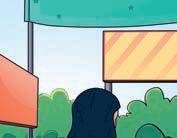

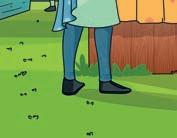


Advertising for an item

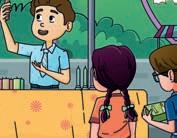
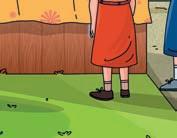







Cover Page Discussion
Say:
Instruct: picture picture.


Welcome to the Speak class. Today, we will read Chapter 11—Slogans for Advertisements. Look at the cover picture for one minute. Observe the things that you see in the
You may ask these suggested questions.

Where do you think the people in the picture are?


(I think the people are at a fair.)
What is the boy in the picture doing?
(The boy is selling candles in the picture.)
What are the different kinds of attractions at the fair?


(A Ferris wheel and some stalls for shopping are the attractions at the fair.)
Have you ever visited a fair? What did you like the most about the fair?

(Yes, I have visited a fair. I liked the rides the most. / I liked those stalls that sold toys the most. / No, I have never been to a fair as I do not like crowded places.)
the model description of the cover page.

Listen Text Comprehension


On the cover page, we can see a school fair. There is a ride and some stalls for shopping at the fair. That ride is called the Ferris wheel. A boy is selling candles at his stall.

15 mins
You may ask these suggested questions.

What do you see in the first picture?
Go to page no. 82 of your content book. We will read the text—Smart Bag. Look at the page for one minute.

(I see a boy. / I see a boy who is very happy. / In the picture, there is a boy who is excited about something.)
2. / excited about?
What do you think the boy is happy (I think he is happy / excited about going somewhere. / I think he is happy /
excited about his bag.)
3.
Read the title ‘Smart Bag’. What do you think a smart bag can be?




(I think a smart bag can be a cool-looking bag with a lot of space. / In my opinion, it is a bag with some kind of technology.)
Smart Bag
We are going to read a text called . It is about a boy who sees an advertisement about a special backpack. It has so many special features that after reading about them, you would want to buy the bag. Now, let us begin reading. Pay attention to how the special features of the bag are being mentioned. Also, note the catchy tagline used in the advertisement.




























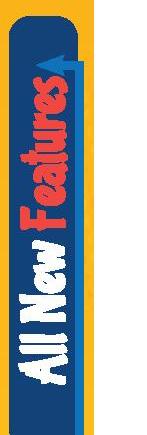





































the text aloud OR play the Talking Book
in the classroom.


bak.pak. You may stress on the syllable in bold, like ‘bak’.
You may pause at the annotations and ask these suggested questions.

After
Who is speaking these lines?
(A boy who has seen this advertisement is speaking these lines.)
After
What does the boy want his parents to buy for him?
Why?





(The boy wants his parents to buy a smart backpack for him because it has everything he needs for school. / The boy wants his parents to buy him a smart backpack because it will make him the coolest kid in class.)
After
After
Which feature of the smart bag do you like the most? Why?


The name of this bag is ‘Tech Trolley’. How would you have named the bag? (I would have named it ‘Bag 2.0’. / I would have named the bag ‘The NextGen Bag’.)
(I like the dirtproof feature the most as my bag gets very dirty. / I like that the bag has wheels as my bag is very heavy to carry. / In my opinion, the feature I like the most is the fingerprint lock. It will help keep my things safe.)
For open-ended questions, you may rephrase the learners’ responses into complete sentences. For example: I would have named the bag ‘The NextGen Bag’.
After the Text
You may ask these suggested questions.

What is the slogan for the smart bag advertisement?
What will the first 100 buyers get? of up to 50 per cent.)
(The slogan for the smart bag advertisement is ‘Be the Coolest Kid Around!’.)


3. What are some cool features of the bag?




2. (The first 100 buyers will get up to 50% off. / The first 100 buyers will get a discount
(The bag has an alarm clock. / The bag can be dragged as it has wheels. / There will be no fear of losing anything as it has a fingerprint lock. / The books and notebooks will be safe as the bag is waterproof and dirtproof.)






Say: with them.


Read aloud
Instruct:
the first keyword, its meaning and the example sentence. Repeat the word after me—advertisement (a.dvuh.tiz.muhnt).
Instruct: the good things in an object.
Instruct:
Now, we will understand the meaning of some words and learn to make sentences
Repeat the meaning after me—a notice, picture or film that informs people about

Repeat the sentence after me—I saw an advertisement on the TV about a brand-new video game.
Repeat this process for the other keywords as well.



Pronunciation Meaning Sentence backpack bak.pak a duht.proof something easy to clean.
features fee.chuhz special something My lif.ting carrying up the stairs.
You may break the sentences into meaningful chunks for the learners to repeat them without difficulty. For example: I can fit / all my books / in the / new backpack.


backpackbak.paka bag you carry on your back I can fit all my books in the new backpack. duht.proofsomething from which dirt can The dirtproof ball that I got for my dog is featuresfee.chuhzspecial qualities of somethingMy fridge has great features like a cold water tap and smell remover. lifting lif I needed help lifting the heavy suitcases

Say: Now, I will call you, one by one, so that you can present your sentences for the keywords. Instruct: Make some sentences with the word ‘advertisement’ and tell them to me.
Repeat this process with all the keywords.
Model Responses:
1. There is a new for a chair in the newspaper today.
2. Monal’s is comfortable and easy to carry.
3. My new shoes are and easy to clean.
4. The new phone has cool including a great camera.
Conclusion

advertisement backpack dirtproof features me lifting Smart Bag.
5. Ramesh helped me with the heavy box to the first floor.

Say: Today, we read a text called We read about a boy reading an advertisement in the newspaper about a new bag and telling his parents about it. We learnt to identify catchy slogans/taglines and understand key features of a product from an advertisement. We also learnt the keywords ‘advertisement’, ‘backpack’, ‘dirtproof’, ‘features’ and ‘lifting’; and how to use them in sentences.
Homework
Say: Practise the E-Speak 1 projects on page no. 84. Learn to say slogans for advertising the products by listening to and repeating the projects given in the app.










Vidya is selling chocolate ice creams made by her mother. Listen to her










Vidya sings the slogan to sell her favourite homemade mango sundae. Listen and
slogan and record it. record it.

Vidya’s slogan on strawberry crush grabs the attention of a passer-by.






























Text Recall
The name of the chapter is—


Say: Slogans for Advertisements. text called Smart Bag.
In the last class, we read a In the text, a boy reads an attractive advertisement in a newspaper about a cool school bag. In this chapter, we learnt to identify catchy slogans and taglines. We learnt to understand key features of a product from an advertisement. We also learnt the keywords, ‘advertisement’, ‘backpack’, ‘dirtproof’, ‘features’ and ‘lifting’; and how to use them in sentences.



Say: product to pitch it very well.
Example from Text:
Through this text and the projects, we are learning to create a short catchy slogan for an item. We are learning to make an advertisement to pitch for an item and present it. We must use short and catchy slogans that highlight the features of the product that make it different from the other products. We must also advertise attractive offers on the
In the text, we read an advertisement for a backpack. The slogan for the backpack is ‘Be the Coolest Kid Around!’ The advertisement also mentions the features of the bag which make it special. Some of the features are its built-in alarm clock, wheels to carry the bag easily, its stylish design and its fingerprint lock. It is water-proof, dirtproof and easy-to-clean. The advertisement also mentions an attractive offer which is up to
50% off for the first 100 buyers.


Example from E-Speak 1: of

As a part of your homework project, you heard Vidya sing the slogans to sell the ice creams made by her mother. She made a slogan for chocolate ice cream, mango sundae and strawberry crush.
E-Speak 1
Say:
Now, I shall say the slogans made by Vidya.
Instruct: is a treat!
Instruct: delight.
Repeat the Project 11A after me—Scoop, Savour, Repeat—Our chocolate ice cream
Repeat the Project 11B after me—Mango cream in every bite, it is a delicious
Instruct: cream is supreme.
Repeat the Project 11C after me—Berries and cream are a dream; strawberry ice



You may break the sentences into meaningful chunks for the learners to repeat them without difficulty. For example: Scoop, / Savour, / Repeat— / Our chocolate ice cream / is a treat!









Make a catchy slogan to sell handmade cards.












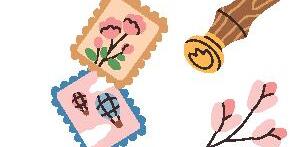
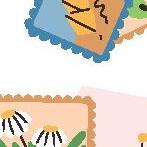









































Explain:
You have to present a catchy slogan in front of the class to sell handmade cards. You can look at the example for help.
Instruct:
Invite presentation.

Think for 2–3 minutes and then make your presentation. as many learners as possible for their presentations. Follow the E&R cycle for each


You may encourage the learners to present their slogans with proper voice modulation, actions and
Model Responses:

1. Hello everyone!
Listen to my slogan.
A perfect gift for family and friends, These handmade cards follow the latest trends.
Thank you.
2. Hello everyone! Listen to my slogan.
Our handmade cards are made with love and affection, They are perfect for every theme and occasion.
Thank you.
3. Hello everyone!

Listen to my slogan. The handwritten messages are one-of-a-kind, These handmade cards are beautifully designed. Thank you.





Conclusion
Homework

1. E-Speak 2: app best
2. Plan and Speak: advertisement interesting.
You have to record in the app an advertisement to sell colourful caps at the winter carnival, in 3–4 lines. First, listen to Rita’s advertisement in the app. Then, practise your lines in front of the camera and make several attempts before submitting your final response. The best model answer will be read out to the class. You have to create an advertisement for any one of the objects given on page no. 87. You can write down the lines for the advertisement. Then, practise saying the advertisement aloud, again and again, in front of an older family member You may create posters or use props to make your






Introduce View of the City.
the Gaming Zone activity to the learners—
Say: advertisements on them.
Look at the picture. It is a picture of a city. Notice the buildings—they have many
Instruct:
Show the example
Circle any three advertisements that you can spot. given in the book.
You may ask these suggested questions.



Is there an advertisement for a house in the picture? Where is it?


(Yes, there is an advertisement for a house. It is near the centre top of the picture.)
2. green coloured board.)
Where is the advertisement for the mobile phone?
(The mobile phone advertisement is on the right-hand side of the picture. It is a
3. cab service.)
4.
Can you guess what the advertisement with the car could be about?
(I think the advertisement is about a brand-new car. / In my opinion, the advertisement might be about petrol. / I think the advertisement could be about a

Tell me any three products whose advertisements you can spot in the picture. (I can see advertisements for a burger, a cold drink and pizza.)
Listen Echo E-Speak 2
Say:




You did the digital project called ‘Sell Your Caps’, where you had to share your advertisement for selling colourful caps at your school’s winter carnival.
Instruct:
Listen to my response to the project.
‘The caps are cool with colours bright.
You can wear them, day or night.
They come in all sizes.
You can buy them at cheap prices.’
Say:
Now, you will listen to another response and repeat after me.
‘These woollen caps are soft and warm.
They save you from the cold.
These designer caps are great to wear
Whether you are young or old.’


8 mins


You can also read a few of the best responses, submitted on the app by the learners, to the class and ask the learners to repeat those responses.




Share your advertisement with everyone in the class. Say the advertisement a few times in front of your family and friends.


























Plan and Speak


The Final Show

Select any ONE object. Create an advertisement on it and present it to the class.
Choose the object that you want to sell.











(write a slogan here)




Write: Complete the advertisement for the object you chose.









Say:
You have to create an advertisement for any one of the objects given on page no. 87. You have to present the advertisement to the class. as many learners as possible for their presentations. Follow the E&R cycle for each
Invite many presentation.

You may remind the learners that they can make their advertisements interesting by using posters or props.
You may guide the learners to present the advertisement using proper expressions, tone and hand gestures. They should maintain eye contact with the audience while presenting.
ATTENTION! ATTENTION!
1. Hello friends I am here to advertise the ‘Blossom Soap’.
Smooth as silk, germs
Thank you.
Our soap is made of natural oils and milk. This special soap kills all germs and will keep you fresh all day!
2. Hello! I will say a slogan on the toy ‘Cool Truck’.
ATTENTION! ATTENTION!

Zoom, whoosh, keep driving fast,
With this truck, you will have a blast.


This brand-new truck has sensors that will locate walls and stairs, and it will turn
away by itself!
Thank you.
Hello friends! I am here to sell the ‘Sparkly Colours!’.
ATTENTION! ATTENTION!
From sunsets to skies, With these crayons, our creativity flies!
Thank you.

3. The new crayons are smooth and make your drawings look bright and beautiful.



Conclusion 2 mins
Say: In this chapter, we learnt to create short and catchy slogans or taglines. We also learnt to present an advertisement to pitch for an item.




Say a few lines on a topic
Learning Objectives: Learners will be able to:
• present a short speech on a topic in a formal manner.
• present the speech with appropriate body language, fluency and confidence.

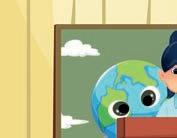













Say a few lines on a topic







Cover Page Discussion
Say:
Instruct: picture picture.


Welcome to the Speak class. Today, we will read Chapter 12—Deliver a Speech. Look at the cover picture for one minute. Observe the things that you see in the
You may ask these suggested questions.

What day is shown in the picture? How do you know?



(The picture shows Earth Day. I can see a poster of Earth Day in the picture.)
What do you think is happening in the picture?
(I think a girl is giving a speech in a school assembly on Earth Day.)
How does the girl, who is giving the speech look?
(The girl who is giving the speech looks happy and confident.)
did you give the speech?


Like the girl in the picture, have you ever given a speech at your school? If yes, when
(Yes, I gave a speech at my school on Independence Day. / Yes, I gave a speech at my school at a school competition. / No, I have never given a speech at my school.)
the model description of the cover page.


On the cover page, we can see a school assembly on Earth Day. We can see a girl delivering a speech on the mic in the assembly. The girl looks happy and confident while delivering her speech. The other children are listening to her.


Go to page no. 90 of your content book. We will read the story—Celebrating Earth Day. Look at the page for one minute. You may ask these suggested questions.

Who do you see in the picture?
(I see a teacher and some children in the picture.)
What are the children doing?
(The children are planting trees.)
Why do you think the children are wearing gloves?


(I think the children are wearing gloves so that their hands don’t get dirty while planting trees / while working with mud.)


Have you ever planted trees at your school like the children in the picture?

(Yes, I have planted trees at my school. / No, I have never planted trees at my
school.)
Celebrating Earth Day.

Instruct:

We are going to read a story called In the story, we will read about a school celebrating Earth Day. A girl named Stuti will give a speech at school assembly on Earth Day. Now, let us begin reading. Pay attention to how Stuti presents her speech at school assembly.









plant saplings to make our Earth cleaner. Let us be good friends with our planet.
Earth Day, everyone!”
applause . After the assembly, the

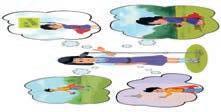





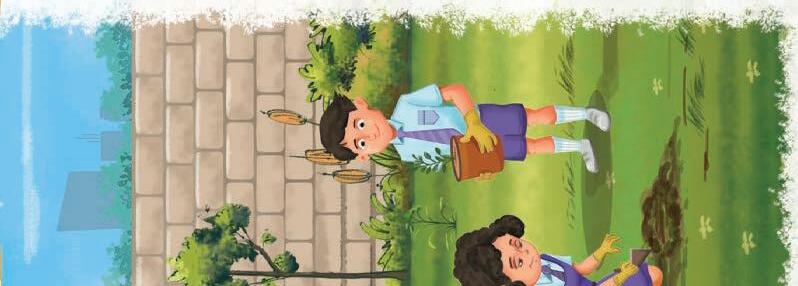









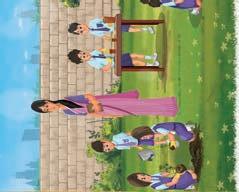
On a sunny 22 April, also known as Earth Day, the Little Blossom School was with excitement. The students could not contain their enthusiasm because a special assembly had been planned for them. It would be followed by a enthusiasm to find ways to protect the environment. She and her friends help clean the school playground

Stuti was practising her speech for the special assembly that day. Her friends cheered at the school playground in anticipation. She about her love for the planet:

Stuti is a confident young girl. She is always filled with weekly to keep it litter-free. her as the rest of the students gathered stepped forward, speaking passionately “Hello Everyone,
It is Earth Day today. We celebrate our beautiful planet on this day and also learn how to take care of it. It is our home. It gives us everything we need—air to breathe, water to drink, and land to live on. The Earth gives us gifts like trees, flowers, animals, and clean air. But sometimes, we forget to take care of our planet, and that’s why we have Earth Day. We can also be the superheroes of our planet Earth by adopting simple daily habits. We can start by picking up the litter, saying ‘no’








in the classroom.



You may pause at the annotations and ask these suggested questions.
After


On which day was the special assembly planned in the Little Blossom School? (The special assembly was planned for 22 April, Earth Day, in the Little Blossom
After Who was practising the speech for the assembly? (Stuti was practising the speech for the assembly.)
After
the story aloud OR play the Talking Book School.) say and


What did Stuti say about plastics and lights in her speech? (Stuti said that we should say no to plastic and turn off the lights when we don’t need them.)
After

You may help the learners to reframe their answers into complete sentences. For example: children planted trees at the edges of the school grounds after the assembly.
After the Text
You may ask these suggested questions.


What did the children do after the school assembly? (The children planted trees at the edges of the school grounds after the assembly.)

The
What did Stuti and her friends do to keep the school grounds litter-free? (Stuti and her friends cleaned the school grounds weekly to keep it litter-free.)



2. What did the audience do after Stuti gave her speech? (The audience appreciated her with applause after the speech.)
3.


On which day is Earth Day celebrated? (Earth Day is celebrated on 22 April.) not using them.)
4. What are some of the different ways in which we can take care of our planet? (We can take care of our planet by planting more trees. We can keep our surroundings clean by picking up the litter and by reducing the use of plastic. We can also take care of our planet by turning off the lights and fans when we are





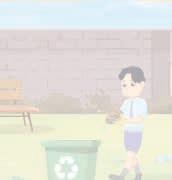
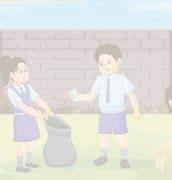







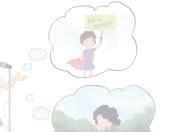


(uh.plawz): clapping of hands to show enjoyment or approval of something buh.zing): to be full of excitement (en.thyoo.zee.a.zm) gathered (ga.thuhd): came together as a group passionately (pa.shuh.nuht.lee): in a way that shows very strong feelings or emotions about something
• Deliver a Speech







to plastic, and turning off lights and fans when we don’t need them. We can also plant saplings to make our Earth cleaner. Let us be good friends with our planet. . After the assembly, the children joyfully planted the trees at the edges of the school grounds.









U24ENCB_Grade4.indb 91 12/13/2023 5:05:11 PM


Say: with them.
Read aloud


Instruct: plawz).
Instruct: hands of something.
Instruct:

Now, we will understand the meaning of some words and learn to make sentences the first keyword, its meaning and the example sentence. Repeat the word after me—applause (uh. Repeat the meaning after me—clapping of hands to show enjoyment or approval
Repeat the sentence after me—There was loud applause after the dance performance. Repeat this process for the other keywords as well.


Pronunciation

PronunciationMeaning
Meaning
buh.zing to be full of excitement The way to the zoo.
.zee.a.zma strong feeling of excitement about something
buzzing buh to be full of excitementThe children were buzzing on the
en. .zee.a.zm a while playing basketball. gathered ga.thuhd group The passionately pa.shuh.nuht.lee in passionately.
Trina is always filled with enthusiasm gatheredga came together as a groupThe people gathered in the park to celebrate Independence Day.
passionatelypa.shuh.nuht.leein a way that shows very strong feelings or emotions about something Preeti practised playing the drums
You may break the sentences into meaningful chunks for the learners to repeat them without difficulty. For example: The children / were buzzing / on the way / to the zoo.



Model Responses:
E & R applause performance buzzing enthusiasm gathered passionately
Say: Now, I will call you, one by one, so that you can present your sentences for the keywords. Instruct: Make some sentences with the word ‘applause’ and tell them to me. Repeat this process with all the keywords.
1. There was a big round of after the performance was over.
2. My brother and I were when we were going to visit our cousins.
3. Rohan was full of about his Science project.
4. The children on the terrace to celebrate Holi.
Conclusion
5. Megha recited the poem on India.
Say: Today, we read a story called Celebrating Earth Day.


Day celebrations at Little Blossom School. A girl named Stuti presented a speech at school assembly on Earth Day. After the assembly, the children had a tree-planting event on the school grounds.
We also learnt the words ‘applause’, ‘buzzing’, ‘enthusiasm’, ‘gathered’ and ‘passionately’; and how to use them in sentences.
Homework
In the story, we read about Earth to
Say: Practise the E-Speak 1 projects on page no. 92. Learn to give a speech by listening to and repeating the projects given in the app.













Shlok gives a speech on ‘The Importance of Riding a Bicycle’. Listen to how he introduces the



Shlok tells us why riding a bicycle is important. Listen and record it.





Shlok sums up his points to conclude his speech. Listen and record it.


















































Text Recall



Say: Deliver a Speech.
The name of the chapter is
Celebrating Earth Day.
In the last class, we read a story called In the story, we read about the celebration of Earth Day at Little Blossom School. A girl named Stuti gave a speech on Earth Day at school assembly. After the school assembly, the children had a tree-planting event on their school grounds. We learnt to present a short speech on a topic in a formal manner and with appropriate body language.



We also learnt the keywords ‘applause’, ‘buzzing’, ‘enthusiasm’, ‘gathered’ and ‘passionately’; and how to use them in sentences.
Say: speech
Through this story and the projects, we are learning to present a short speech in a formal manner with proper body language, fluency and confidence. When delivering a speech, we must begin with a greeting, focus on the main points of the topic that we have chosen, and end on a note that shows our clear support for the topic. We must also have proper body language and be confident when delivering a speech so as to communicate our points clearly to the audience.
Example from Text:


In the story, we read that Stuti confidently presents her speech at school assembly on Earth Day. She gave her speech passionately. In the speech, she mentioned the different gifts we get from our planet Earth like fresh air to breathe, land to live on, and water to drink. Stuti mentioned the different ways in which we should take care of our planet, like picking up litter, saying no to plastic and switching off the lights and fans when we are not using them. We can also help planet Earth by planting trees. Everyone appreciated Stuti’s speech with applause.
Example from E-Speak 1: of

As a part of your homework project, you heard Shlok give a speech on ‘The Importance of Riding a Bicycle’.
E-Speak 1
Say: a Bicycle’.
Now, I shall read out to you the speech that Shlok gave on ‘The Importance of Riding
Instruct: Bicycle’.

Repeat the Project 12A after me—Good morning teachers and my dear friends. I am Shlok. Today, I am going to share my views on the topic ‘The Importance of Riding a


Instruct: Repeat the Project 12B after me—Riding a bicycle is good for the environment. It is a pollution-free mode of transport. It is a good form of exercise. It improves our
balance and posture.
Repeat the Project 12C after me—To conclude, I would like to say that we should use a bicycle for travelling short distances. Let us try to use an eco-friendly way to travel.

Instruct: difficulty. For example: Good morning / teachers / and / my dear friends. / I am Shlok. / Today, / I am going to / share my views / on the topic / ‘The Importance of / Riding a Bicycle’.












Your class has to present an assembly. You have to give a short speech on the topic ‘Electric Vehicles: An Ecofriendly Way to Travel’.










































Explain: on
You have to present in front of the class, a short speech on the topic ‘Electric Vehicles: An Ecofriendly Way to Travel.’
Instruct: Invite presentation.
Think for 2–3 minutes and then make your presentation. as many learners as possible for their presentations. Follow the E&R cycle for each


Model Responses:
Good morning, everyone.

You may encourage the learners to stand straight and maintain eye contact with the audience while giving the speech. Ask them to speak loudly and confidently.

I am Seema of class 4. Today, I am going to present my views on the topic ‘Electric Vehicles: An Ecofriendly Way to Travel’. I think electric vehicles should be used because they produce no harmful gases and do not make a loud noise. To conclude, I would like to say that we should keep our environment safe.
Good morning, everyone.
3. Good morning, everyone.

2. about vehicles.
I am Shyam of class 4. Today, I am going to present my views on the topic ‘Electric Vehicles: An Ecofriendly Way to Travel’. I think electric vehicles should be used because they are good for the environment and have a speed limit. To conclude, I would like to say that we should switch to ecofriendly modes of travel.


I am Rohit of class 4. Today, I am going to present my views on the topic ‘Electric Vehicles: An Eco-friendly Way to Travel’. I think electric vehicles should be used because they cause less pollution and save the money spent on fuels. To conclude, I would like to say that we should pledge to create awareness about electric



Conclusion
Homework

1. E-Speak 2:
2. Plan and Speak:
You have to record in the app a speech on the topic ‘The Need to Have a Hobby’, in 3–4 lines. You can talk about the benefits of having a hobby. You may listen to the audio stimulus given in the app for your help. Practise in front of the camera and make several attempts before submitting your final response. The best model response will be read out to the class. You have to think and prepare a speech on the topic ‘What I want to be when I grow up’. You may write down the lines and practise telling them loudly in front of an older family member.






Need to Have a Hobby’. Think










you to present a speech on ‘The and talk about the benefits of (E) if we use them at the end.




Take a look at these phrases. Put (S) if we use them at the start of a speech and


I am going to present my views on the topic ...
To conclude, I would like to say …
My friend and I would like to talk on ...


Let us promise ...




















12_U24EN0412.indd 94 12/21/2023 6:58:36 PM




the Gaming Zone activity to the learners—How to Give a Speech
Given below are some sentences that are usually used while giving a speech. Read the sentences carefully. Write (S) beside the sentence if it is used at the start of the speech and (E) beside the sentence if it is used at the end of the speech. You may ask these suggested questions.



What do you say when you start a speech? (At the beginning of a speech, I say about the topic I want to talk about.)
What do you say at the end of a speech? (I thank the audience at the end of a speech.)
When do you say the line ‘To conclude, I would like to say…’? (I say this line at the end of a speech.)

You did a digital project called ‘Having a Hobby!’, where you had to record about the benefits of having a hobby, in 3–4 lines. Listen to my response to the project.
Instruct: Say: Ramesh.

‘Good morning! My name is Sujata. Today I am going to share my views on the topic ‘The Need to Have a Hobby’. It is good to have a hobby as it keeps us engaged during our free time. Also, this is the time when we do something that we love.’
Now, you will listen to another response and repeat after me.

‘Hello everyone! My name is Ramesh. Today I am going to share my views on the topic ‘The Need to Have a Hobby’. It is good to have a hobby as we can learn a lot and explore many new things. Hobbies make us feel refreshed and happy.’






You can also read a few of the best responses, submitted on the app by the learners, to the class and ask the learners to repeat those responses.




Practise your speech at your home with an elder.

In class, tell your friends what you want to be when you grow up.























Use hand gestures and facial expressions. present your speech to the class.

I want to conclude by saying that I will work hard to achieve my dreams.







Complete the sentences. My name is Today, I am going to share my views on the topic I want to be a I want to be a My role model is I like this profession because Thank you.















• Deliver a Speech




Say: I grow up’.
Invite many presentation.
You have to present to the class a speech on the topic ‘What I want to be when as many learners as possible for their presentations. Follow the E&R cycle for each


Model Responses:
20 mins
1.
Good morning, everyone. My name is Suhana of class 4.
I want to be a doctor when I grow up.
2.

Today, I am going to share my views on the topic ’What I want to be when I grow up’.
I want to be a doctor because I will be able to help patients. My role model is my mother who is also a doctor.
I like this profession because I like to help people and take care of them. I want to conclude by saying that I will work hard to achieve my dreams.
Thank You!
Good morning, everyone. My name is Amit of class 4.


Today, I am going to share my views on the topic ‘What I want to be when I grow up.’
I want to be a pilot when I grow up. I want to be a pilot because I will be able to fly a plane.
My role model is my aunt who is a pilot. about different types of aeroplanes.
I like this profession because I love to travel to different places and I enjoy learning I want to conclude by saying that I will work hard to achieve my dreams.
Thank You!




Conclusion 2 mins
Say: In this chapter, we learnt to present a short speech on a topic in a formal manner using appropriate body language and with fluency.


This Conversations book aims to systematically build English language skills in learners and enable them to verbally express themselves in real-world situations. Each chapter focuses on building specific English language competencies and weaves together activities that are research-based, age-appropriate, contextual, experiential and joyful. The activities adhere to the highly recommended and research-based teaching-learning method known as the Gradual Release of Responsibility (GRR), which has been endorsed by the NEP, 2020 and the NCF, 2023. Through the series, learners receive dedicated time and space within the classroom to express themselves in English which helps them in becoming confident speakers of the language.
• Activity-based Learning: The book offers joyful experiential activities that build English communication competencies.
• Texts per the NEP 2020 Themes: The book has exciting and stimulating texts that pave the way for English communication activities.
• Tech Integration: The book works in sync with the digital world, where various other activities and projects are undertaken. Learner outputs are evaluated through an AI-based speech recognition engine.
• Teachers’ Manual: The book is complemented by the Teachers’ Manual that enables teachers to conduct each session effectively.
Uolo partners with K-12 schools to provide technology-based learning programs. We believe pedagogy and technology must come together to deliver scalable learning experiences that generate measurable outcomes. Uolo is trusted by over 10,000 schools across India, South East Asia and the Middle East.